Cultura:
Back to my roots
Volver a mis raíces

La Vida:
Teens use style to speak out

Adolescentes alzan su voz con estilo
College:
3 Paths to a debt-free degree
The story behind Inter American University in Philadelphia
3 caminos a una carrera sin deudas
La historia detrás de la Universidad
Interamericana en Filadelfia
Careers: Immigration law
Derecho migratorio
Embrace Your Heritage Abraza tus orígenes, p. 5
EXPRESS CULTURA EXPLORE UNIVERSIDAD ENGAGE TU FUTURO ADVOCACY EDITION

WE CAN TAKE YOU TO YOUR FUTURE. ¿Aspiras a enseñar a niños de edad preescolar? Podemos llevarte a tu futuro. Obtén tu Bachillerato en Artes en Educación en Niñez Temprana. Fully bilingual Course delivery options Very affordable MSCHE-accredited Financial aid available Totalmente bilingüe Diversas modalidades de estudio Muy asequible Acreditado por la MSCHE Ayudas económicas si cualificas Inter American University of Puerto Rico holds a Renewal License from the Puerto Rico Board of Postsecondary Institutions and is accredited by the Middle States Commission on Higher Education (MSCHE), 1007 North Orange Street, 4th Floor, MB #166, Wilmington, DE 19801. MSCHE is an accreditation agency recognized by the U.S. Secretary of Education and the Council for Higher Education Accreditation. philadelphia.inter.edu
CONTENTS DENTRO

2 From the Founder | 3 Letters to Motivos
CULTURAL EXPRESSIONS:


4 Poetry: Where I’m From
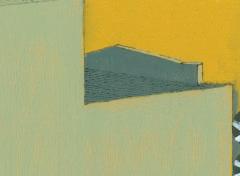





5 Reconnecting with My Native Roots

LA VIDA:
8 Acts of Advocacy Bring Us Together for Good
10 Fashion and Advocacy: How teens use style to speak out
12 Freedom Through Discovery: Motivos Summer Video Camp

14 Inspiration in Our Community: Meet Gregory Mowle


16 Screenagers and Our Twisted Media Minds

18 Relationships: How to Advocate for Your Needs
19 Joke with a

COLLEGE PREP:

20 Leadership Spotlight: Rutgers University ROTC cadet and first-gen college student finds family, funding, and guidance to navigate his future

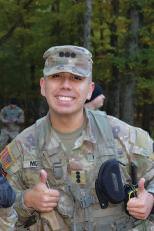
22 The Power of Accessible Education: A look behind the scenes of InterAmerican’s new Philadelphia campus
26 Insider Tips for College: Three Ways to Aim for a Debt-Free Degree
27 Dinero for College: Must-have scholarships list and free ebook!

CAREER EXPLORATION:
Advocacy in Action: Could immigration law be the career for you?



Motivos Team Moments:
1. 9.23.22: Motivos participates in the Latin American Book Fair at Love Park, Philadelphia, PA

2. 9.24.22: Motivos gets youth poetry on bus boards in the Fishtown neighborhood of Philadelphia, PA, and it’s covered in the Inquirer newspaper
3. 10.1.22: Motivos supports Geoffrey’s Voice suicide prevention event, Philadelphia, PA

4. 10.11.22: Motivos attends opening of InterAmerican University’s new branch campus in Philadelphia, PA
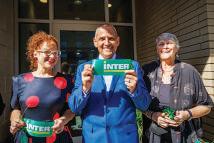
5. 10.11-11.15.22: Motivos Team Talk segment hosts Rutgers, Widener, Temple, and Drexel University ROTC programs
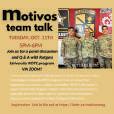
6. 10.25.22: Motivos Team Talk segment hosts Philadelphia Inquirer Community Engagement Editor, Sabrina Iglesias

7. 11.7.22: Motivos team attends Columbia Scholastic Press Association’s 83rd annual fall conference in New York, NY

8. 11.8-14.22: Motivos founder presents her signature program, Write Your Way to College and Beyond, at Community Academy of Philadelphia Charter School, Revolution School, Frankford High School, First Philadelphia Preparatory Charter School, and Kensington High School for over 100 students through the support of the US Army ROTC, Philadelphia, PA

9. 12.6.22: Motivos Team Talk segment hosts the creative producers behind the innovative River Alive! Learning Trail under the auspices of the Tookany Tacony Frankford Watershed Partnership

10. 12.17.22: La Casa Latina at the University of Pennsylvania hosts Motivos Team Retreat, Philadelphia, PA
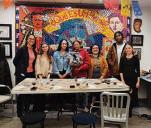
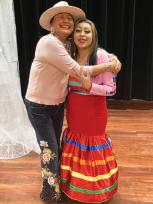
11. 12.17.22: Motivos founder and group of mentees take a fun excursion to Christmas Village, Philadelphia, PA

MOTIVOS
Share your personal story, poetry, photography, and/or illustrations with Motivos. No more than 1200 words in English or Spanish. Edited text preferred. Check www.motivosmag.com for next submission deadline.
Send your articles to: editor@motivosmag.com, or mail to: Editor, Motivos magazine, P.O. Box 34391, Philadelphia, PA 19101.

¡ESCRIBE PARA MOTIVOS!
Comparte tu historia, poesía, fotografía ó ilustraciones con los lectores de Motivos. No más de 1200 palabras en inglés o en español. Se prefieren artículos ya editados. Envía tus artículos a: editor@motivosmag.com o por correo a: Editor, Motivos magazine, P.O. Box 34391, Philadelphia, PA 19101.
:: ::ULTURAL EXPRESSIONS
COLLEGE REP :xEXPLORATION v LA VIDA
C ::p
:: ::ULTURAL EXPRESSIONS C ::pCOLLEGE REP ::xCAREER EXPLORATION v LA VIDA
:: ULTURAL EXPRESSIONS ::pCOLLEGE REP ::xCAREER EXPLORATION v LA VIDA
Moral: When we stand up for our values, we make a better world
WELCOMES SUBMISSIONS!
WWW.MOTIVOSMAG.COM :: ::ULTURAL EXPRESSIONS C ::pCOLLEGE REP ::xCAREER EXPLORATION v LA VIDA 22 14 5 28 10 1 2 8 3 5 11 10 7 8 9 4 6
VOLUME 16, NUMBER 3
Founder/Publisher
Jenée Alicia Chizick Agüero
Editors/Translators
Michaela Choi, Anna Drake, Ariel Pichersky, Vera Senderowicz Guerra, Agustina Tullio
Graphic Design
Johanna Shane Rogayan, Jenette Sityar
Contributing Writers

Jorge Arturo Agüero, Rockell Bartoli, Jenée Alicia Chizick Agüero, Michaela Choi, Malaya Combs, Giovanna Delima, Xavier Garay, Ramses Montes, Gregory Mowle, Fiorenza Petrozzi, Delaney Sill, Brigitte Zigglih


Artwork/Photography
Yohel Agüero, Jenée Alicia Chizick Agüero, Malaya Combs, Xavier Garay, Gregory Mowle, Courtesy of the US Army, Isaac Rivers
Youth Editorial Team
Malaya Combs (Production Assistant), Ben Figueroa (Mentor), Karyme Font (Media Fellow), Edgerin McArthur, Yandelik Alexandra Navedo, Lizmary Ortiz (Media Fellow), Gianna Rose Padilla (Outreach Assistant), Kylee Padilla, Fiorenza Petrozzi, Steven Ramsey Jr., Trent Randle, Isaac Rivers, Kayla Rosario, Delaney Sill, Anayeli Tapia, Brigitte Zigglih
Cover Photo
Photography by Malaya Combs.
Reconnecting with My Native Roots, p. 5.
Special Thanks
US Army ROTC program for sponsoring Motivos Write Your Way to College and Beyond workshops for Community Academy of Philadelphia Charter School, Revolution School, Frankford High School, First Philadelphia Preparatory Charter School, and Kensington High School in Philadelphia, PA, and to Philadelphia Youth Media Collaborative for funding Motivos team participation in the Columbia Scholastic Press Association’s 83rd annual fall conference in New York City.
Motivos is the nation’s largest bilingual quarterly print magazine with youth-generated content. We have over 90,000 readers from participating youthserving organizations, schools, libraries, cultural organizations, and colleges in the United States, Puerto Rico, Costa Rica, and Colombia. Over 30,000 youth have participated in our workshops, media institutes, summer camps, and conferences. For more information, to order Motivos for your organization, or to book a program or speaker, go to: www.motivosmag.com.
For advertising or subscription options, call 267-283-1733 or send an e-mail to: info@motivosmag.com.
Motivos magazine


P.O. Box 34391 Philadelphia, PA 19101 info@motivosmag.com www.motivosmag.com
Copyright © 2022 Motivos, LLC. All rights reserved. Copying, reproducing, or transmittal of this publication by any means is prohibited without the permission of the Publisher. The Publisher is not liable for any damages due to editing, changes, cancellations, errors, or omissions. All work submitted for publication is assumed to be the provider’s original work, and the Publisher accepts no liability as a result of publishing such works. The viewpoints expressed are those of the authors and not necessarily those of Motivos. Motivos is a nationally registered trademark. Unauthorized use of the Motivos name is prohibited.
Welcome to the Advocacy edition!
Advocacy is about standing up for what you believe will improve circumstances. It’s about helping people find, express, and preserve their voice to do so. That is at the very core of why I founded Motivos in 2006, and it is still at the center of our programming and magazine content.
Motivos media mentees curated topics they feel strongly about to present to you in this edition. Malaya advocates for intentionally connecting to our cultural roots (p. 5), and Delaney (p. 16) offers steps to combat the toxic side of social media. Ramses implores us to seek out green spaces and get involved with a collective as a way to inclusively build community, be good stewards of the natural world, and amplify our creative voices (p.8). Asquith approaches those in power to prioritize student needs in educational settings (p. 22), and Gregory (p. 14) shares how higher education helped him shatter glass ceilings. Inter American University of Puerto Rico (p. 22) steps up efforts to address the shortage of teachers by opening a new branch campus in the heart of Latino North Philadelphia, and Rockell Bartoli, founder of The Scholar Budget, advocates for debt-free degrees by outlining three ways to accomplish just that (p. 26).
We hope by reading this edition, you’ll get pumped up to advocate for what gives you a strong connection to your own and your community’s well-being and advancement.
¡Les
Defensa!
Hablamos de defender lo que crees que mejorará las circunstancias. Se trata de ayudar a los demás a encontrar, expresar y preservar su voz para ello. Esa es la principal razón por la que fundé Motivos en 2006 y sigue siendo el centro de nuestra actividad y del contenido de la revista.
El equipo de Motivos seleccionó temas que quisiera presentarles en esta edición. Malaya defiende la búsqueda de conexión con nuestras raíces culturales (p. 5) y Delaney (p. 16) ofrece pasos para combatir el aspecto tóxico de las redes sociales. Ramses nos ruega que busquemos espacios verdes y nos involucremos con un colectivo para construir comunidad de manera inclusiva, ser buenos defensores de la naturaleza y amplificar nuestras voces creativas (p. 8). Asquith demanda a quienes están en el poder que prioricen las necesidades de los estudiantes (p. 22) y Gregory (p. 14) cuenta cómo lo ayudó la educación superior a romper techos de cristal. La Universidad Interamericana de Puerto Rico (p. 24) intensifica los esfuerzos para abordar la escasez de docentes al abrir una nueva sede en el corazón latino del norte de Filadelfia, y Rockell Bartoli, fundador de The Scholar Budget, defiende el derecho a graduarse sin deudas mostrando tres maneras de lograrlo (p. 26).

Esperamos que al leer esta edición te animes a defender aquello que te conecta fuertemente con tu bienestar y con el de tu comunidad.
Jenée Chizick Agüero Founder and Publisher, Motivos magazine

Subscribe to Motivos Today! Home delivery! Get 1 year (4 editions) for only $20! ¡Recibirá una suscripción anual por solo $20! Would you like bulk copies of Motivos for your school? Call us! ¿Quieres más copias de Motivos para su escuela? ¡Llamenos! 267-283-1733 Order online at: www.motivosmag.com Ordene e linea. Follow us @motivosmag! Motivos encourages self-expression, college and career exploration, and community and cultural engagement. Motivos promueve la expresión personal, la exploración de universidades y de carreras, y el compromiso comunitario y cultural. SU22 Con cariño, motivos 2
Motivos Founder
doy la bienvenida
a la edición
FAITH EDITION A Journey of Faith p. 34 34
LETTERS to MOTIVOS

I felt incredibly happy and motivated after attending Jenée’s session [at the US Soccer Foundation’s Urban Soccer Symposium] and would love to explore synergies!

~ Gaby Portillo-Crespo, Program Counselor/Coach, Chicago Rec Sports (Chicago KICS Academy), Chicago, IL

I am SO thrilled about this [her story making the cover of Motivos Self-Discovery edition]! I am absolutely honored and so happy to see how far this has come from being a silly little draft in my documents! Thank you so much for this opportunity, and I hope to submit another piece someday! You have no idea how much this whole experience has meant to me. I’m so beyond grateful!
~ Abigail Flower-Pollard, author of Motivos Self-Discovery edition’s cover story, Vol. 16 No. 1, Medina, NY
The most recent issue of Motivos is amazing! Bravo to you and your kids! I shared it with our ESL educator who is a member of our Girl Rising cohort, and we were so impressed! Thank you for committing to this work; I hope we can collaborate on something again soon.


~ Ellin Glassband, Girl Rising US Educator Cohort Program Leader and Language Arts Teacher, West Windsor-Plainsboro Regional School District, West Windsor Township, NJ
Thank you so much for inviting me to attend and participate in the Motivos event Saturday. It was so special to see you [Jenée] in action and get a much better feel for what you do and how it affects youth. Congratulations.
~ Sherri Hope Culver, Fulbright Global Scholar 2022-2023, Host of Media Inside Out and Kid Talk Media, Associate Professor, Klein College of Media and Communication, Temple University, Philadelphia, PA

Send your comments to: feedback@motivosmag.com Facebook, Twitter, Instagram: @motivosmag www.motivosmag.com HEROES START here INNOVATORS START here DREAMERS START here motivos 3
Where I’m From
By Malaya Combs,
I am from the badlands of North Philly, open pill bottles, needles, guns, and drug dealers every corner that I turn… I am from a city of crime. Here, worry is the trend—who will be the next victim? I am from a city that disowns morals, its scaffolds a hierarchy of revenge.

My country is unequal. Here, to be of color—Black—is a crime. My world is brutal and cruel, unsafe and insecure.
I am from a family of morals. The wrong in the world does not take the good from us. Pictures of my grandma encourage me to learn and define.
I am the reflection of acceptance— of self, heritage. I am from the Native American, Filipino, and Hispanic cultures: honorary dances, powwows, regalia, sage, ancestral items, eating rice with my bare hands.
I am from a father who comes and goes. I am from a family not only defined by blood, but one that is bonded through actions and respect.
I’m from something so surreal, a place with big dreams, support along the way, but very little money.




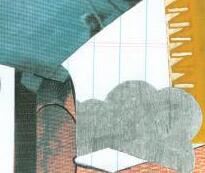
I am from making anything possible. From no excuses, just possibilities—goals, and dreams beyond myself.

:: ::ULTURAL EXPRESSIONS C ::pCOLLEGE REP ::xCAREER EXPLORATION v LA VIDA
Illustration by Isaac Rivers, freshman, Temple University, Philadelphia, PA
freshman, Cabrini University, grew up in Philadelphia, PA
motivos 4
Reconnecting with My Native Roots:
UNDERSTANDING THE IMPORTANCE OF TRADITION AND HERITAGE


 By Malaya Combs
By Malaya Combs
rowing up, my traditions were important to me, but others seemed to perceive them with a significance I didn’t yet understand.
I had always attended powwows, wearing my regalia and eagle feath-




distances to the northern part of North Carolina, where my tribe, the Lumbee Tribe, first originated. My aunt and grandma would sit in the front seat of their red PT Cruiser, driving ten to twelve hours with me and my little cousin in the back, the two of us anxiously fussing, “ARE WE

When you have to travel far to stay connected to your heritage, the distance between becomes limitless. One day, we stopped visiting North Carolina. It wasn’t that I had forgotten—my life just became busier. I was getting older and focusing on my career goals. Everyone drifted into different spaces as we all continued living our own lives. It seemed there was no time to keep up with my Native American heritage. For seven years, I wasn’t actively involved.
When I was young, piling into that PT Cruiser for a road trip was just fun.
I attached no importance to why we traveled so far—the drive was connected to my younger and free-spirited self. Now, I realize I may have taken my participation in tradition for granted. Yet, I don’t think I really knew what it meant to be Native American at the time.
Later, as I learned more and relived some of my childhood experiences, I realized how our dances represent much more than the energy we feel on our two feet. The drums symbolize our mother earth and her heartbeat, representing how loved we are. The singing, in which we all have our own story, tells our painful history: “You did not take our language or heritage from us.” It brings our history and ancestral struggles to life.
In the nineteenth century, the US government forced assimilation on Native Americans, taking tens of thousands of Native American children away from their families and placing them in boarding schools. These weren’t the elite private schools we associate with boarding schools today; these were spaces uniquely created to strip Native Americans of their culture, tradition, and heritage. Tens of thousands of Native children were forced to take on new Anglo-American names, change their hair and clothes, and abandon their way of life because it was believed to be inferior to that of white people (www.history.com, Becky Little, Nov 1, 2018).
In my history classes, I deeply felt the impact of past assimilation policies when I learned that children were brutally beaten near death, with deep, painful scars and wounds on their bodies. They were told only
:: ::ULTURAL EXPRESSIONS C ::pCOLLEGE REP ::xCAREER EXPLORATION v LA VIDA
Photography by Malaya Combs
Mayiki PlainBull wearing her Native attire: feathers, regalia, beaded earrings, braids, ribbon, and beaded hair clips.
motivos 5
Honorary dance for first responders at the Shackamaxon Powwow in Penn Treaty Park, hosted by Cornelia Dimalanta, September 18, 2022.
to speak English and cut their hair. As a Native, I know that our long hair represents the power and strength attached to us. Cutting hair was a way to rob these children of their power and heritage.
Although my ancestors struggled with prohibited language and cultural bans, my family never let the pain prevent the continuation of our Native American tradi tions. They continued the powwows even when there were bans and consequences for disobeying these prohibitions. Today, there's a growing trend among young Native Americans to stay in touch with their roots.
By adopting the customs of my ances tors, singing and coming together with other tribes, I've committed to honoring Native American traditions. That’s the real beauty: despite the upheaval of history, nothing can take away my customs, not even assimilation. I may at times lose touch, but I will always come back to tradition, my home.
On September 18, 2022, my grandma, Cornelia Dimalanta, hosted the first powwow through her organization, The Native American House Alli ance, at Penn Treaty Park in Philadelphia, PA. In my hometown, tribal members came together from several states and countries, including Con necticut, Florida, Canada, and New Mexico. It was a reunion of tribal nations, and Mayor Jim Ken ney and other state senators appeared, discussing the treaty between William Penn and the American Indians. A celebratory event took place, honoring first responders, where the Philadelphia Fire Department received praise and respect through an honorary dance.
This was different from the powwows I normally attended. Usually, I dance and wear regalia. Instead, I sat this one out to observe, seeking insight. I felt at peace, calm, and happy. I didn’t have to travel so far this time—all I had to do was be home and in the moment. The significance was that my heritage was there, and I knew who I was and what I must continue.
In this moment, I witnessed the beauty of the way we honor and bring our traditions to life and how our elders do everything in their power to keep our culture alive. We may not all understand our heritage, culture, and historical identities, but I ask that you take the time to explore the value and meaning of your own identity. Explore your ancestors and elders, and always ask questions to discover your deeper roots.
MEANINGS BEHIND THE WORDS:
Regalia: Clothes that portray the personality, symbols for tribes, and uniqueness of each individual.

Powwow: A celebratory gathering of different tribes that involves singing, drum beats, dancing, and food.
Eagles/Feathers: The eagle is a sacred bird for us because of its hunting ability, impeccable eyesight, and soaring beauty. The eagle is a great spirit to the people above and below because it connects us to the air and sky. The feathers are robust and well put together, even though they are light. The feather has a spiritual meaning, which shows how strong nature is. The birds (eagles) tell us to appreciate life through their song, and we as humans forget how beautiful it is to be alive—to dance, sing, and more.
Reconectar con mis raíces nativas americanas:
la importancia de la tradición y la herencia
e chica, las tradiciones eran importantes para mí, pero los demás parecían percibirlas con un significado que yo aún no comprendía.
Siempre había asistido a powwows, llevando mi ropa de gala y plumas de águila, recorriendo largas distancias hasta el norte de Carolina del Norte, de donde proviene mi tribu, los lumbi. Mi tía y mi abuela conducían su PT Cruiser rojo entre diez y doce horas conmigo y mi primita en el asiento trasero, las dos inquietas: "¿Ya llegamos?".
Cuando tienes que viajar mucho para seguir conectado con tu herencia, la distancia que te separa de ella se vuelve ilimitada. Un día dejamos de ir a Carolina del Norte. No es que me olvidase, es que tenía más ocupaciones en mi vida. Estaba creciendo y concentrándome más en mis objetivos profesionales. Cada quien siguió su propia vida hacia un lugar distinto. Parecía que no tenía tiempo para dedicar a mi herencia nativa americana. Durante siete años, no participé activamente.
De niña, ir en aquel PT Cruiser por la carretera era algo divertido. No le daba importancia al motivo por el que viajamos tan lejos: el viaje se relacionaba con mi yo más joven y libre. Ahora me doy cuenta de que he dado por sentada mi participación en la tradición. Sin embargo, no creo que entonces supiera realmente lo que
Get Involved:
The Native American House Alliance, Philadelphia, PA
Founder & Executive Director: Cornelia Dimalanta
Website: https://nativeamericanhousealliance.org/
Facebook: Native American House Alliance Inc.
Email: nahaincphila@gmail.com
Mission: Our mission is to foster and preserve Native American culture and promote an accurate understanding of Native American experiences, history, and teachings. As part of our mission here in the Greater Philadelphia area, we promote social and economic development and empowerment services that promote self-help among Native populations. Our programs, advocacy efforts, housing, family services, and employment opportunities aim to eliminate prejudice towards and within Native American communities.
Chief Urie Ridgeway of the Lenape tribe, wearing casual traditional attire.
motivos 6
Con el tiempo, cuando aprendí más y reviví algunas de mis experiencias infantiles, me di cuenta de que nuestras danzas representan mucho más que la energía que sentimos en los pies. Los tambores simbolizan a nuestra madre tierra y el latido de su corazón, que representa lo queridos que somos. El canto, en el que todos tenemos nuestra parte, cuenta nuestra dolorosa historia: "No nos arrebataron nuestra lengua ni nuestro patrimonio". Da vida a nuestra historia y a nuestras luchas ancestrales.
En el siglo XIX, el gobierno estadounidense forzó la asimilación de los nativos americanos, separando a decenas de miles de niños de sus familias e internándolos en escuelas. No eran las escuelas privadas de élite que hoy asociamos con los internados; eran espacios creados exclusivamente para despojar a los nativos americanos de su cultura, tradición y patrimonio. Innumerables niños nativos fueron obligados a adoptar un nuevo nombre angloamericano y a abandonar su forma de vida porque se creía inferior a la de los blancos (www.history.com, Becky Little, Nov 1, 2018).

En mis clases de Historia sentí profundamente el impacto de las políticas de asimilación del pasado cuando supe que los niños eran golpeados brutalmente casi hasta la muerte, lo que les dejaba profundas y dolorosas cicatrices y heridas en el cuerpo. Les ordenaban hablar solo inglés y cortarse el pelo, que representa el poder y la fuerza que nos acompañan. Cortar el pelo era una forma de robar a estos niños su poder y su herencia.

Aunque mis antepasados tuvieron que luchar contra prohibiciones lingüísticas y culturales, mi familia nunca dejó que el dolor le impidiera seguir sus tradiciones. Continuaron con los powwows incluso cuando había prohibiciones y consecuencias por desobedecerlas. Hoy en día hay una creciente tendencia entre los jóvenes nativos americanos a mantenerse en contacto con sus raíces.
Scan to hear their stories

Al adoptar las costumbres de mis antepasados, cantar y acudir a encuentros con otras tribus, me he comprometido a honrar las tradiciones. Esa es la verdadera belleza: a pesar de los avatares de la historia, nada puede quitarme mis costumbres, ni siquiera la asimilación. Puede que a veces pierda el contacto, pero siempre volveré a mi hogar.
El 18 de septiembre de 2022 mi abuela, Cornelia Dimalanta, organizó el primer powwow con su organización, The Native American House Alliance, en el parque Penn Treaty de Filadelfia, Pensilvania. Miembros de la tribu procedentes de varios estados y países, como Connecticut, Florida, Canadá y Nuevo México, se reunieron en mi ciudad natal. Se trataba de un encuentro de naciones tribales, y el alcalde Jim Kenney y otros senadores del estado vinieron y hablaron del tratado entre William Penn y los indios americanos. Se celebró un acto de homenaje al personal de emergencias, en el que el Cuerpo de Bomberos de Filadelfia fue reconocido y celebrado con un baile en su honor.



Era algo diferente a los powwows a los que solía asistir. Normalmente bailaba y llevaba mi ropa de gala. Aquí, en cambio me senté a observar, tratando de comprender. Me sentía en paz, tranquila y feliz. Esta vez no tuve que viajar tan lejos: bastó con estar en mi ciudad, en el momento presente. Mi herencia estaba allí, y yo sabía quién era y qué era mi obligación sostener en el tiempo.
En ese momento fui testigo de la belleza del modo en que honramos y damos vida a nuestras tradiciones y de cómo nuestros mayores hacen todo lo que pueden por mantener viva nuestra cultura. Puede que no todos comprendamos nuestra herencia, cultura e identidad histórica, pero te pido que te tomes el tiempo necesario para explorar el valor y el significado de tu propia identidad. Conoce a tus mayores y a tus antepasados, y pregunta siempre para descubrir tus raíces más profundas.
EXPLICACIÓN DE LA SIMBOLOGÍA:
Ropa de gala: Representa la personalidad, los símbolos tribales y la singularidad de cada individuo.
Powwow: Reunión festiva de diferentes tribus en la que se canta, se tocan tambores, se baila y se come.
Águilas/Pájaros: Para nosotros, el águila es un ave sagrada por su capacidad de cazar, su vista perfecta y su belleza. El águila es un espíritu importante para todo el pueblo, porque nos conecta con el aire y el cielo. A pesar de ser ligeras, las plumas son robustas, están bien ensambladas y tienen un significado espiritual: muestran lo fuerte que es la naturaleza. Las aves a través de su canto nos dicen que apreciemos la vida, y nosotros, los humanos, olvidamos lo hermoso que es estar vivos: bailar, cantar y demás.
About the Author
Malaya Combs is a Lumbee Tribal citizen, production assistant for Motivos magazine, and student at Cabrini University majoring in Health Sciences. She loves to write, share her experiences, travel, and explore new things. You can reach Malaya at: malayacombs1@gmail.com

 W. FRANK ADAMS
Chief of the Upper Mattaponi Indian Tribe
PETER BROOKS
Commissioner of Indian Affairs for the State of Maryland
JESSICA LOCKLEAR Lumbee Tribal citizen and historian
CORNELIA DIMALANTA
Co-founder of Native American House Alliance
Close up of beaded work by Mayiki PlainBull and her mother, Sparrow.
W. FRANK ADAMS
Chief of the Upper Mattaponi Indian Tribe
PETER BROOKS
Commissioner of Indian Affairs for the State of Maryland
JESSICA LOCKLEAR Lumbee Tribal citizen and historian
CORNELIA DIMALANTA
Co-founder of Native American House Alliance
Close up of beaded work by Mayiki PlainBull and her mother, Sparrow.
motivos 7
Mayiki PlanBull holding her eagle feather.
ACTS OF ADVOCACY BRING US TOGETHER FOR GOOD



 By Brigitte
By Brigitte

Our senior class was up in arms. Though we voiced our concerns to teachers, we felt we had little say in the conditions we found ourselves in. Workspaces were inadequate and study halls too infrequent, the dress codes felt invasive, and food options lacked variety. After a few months of spinning our wheels, I took the initiative to meet with Mr. Goins—the President of Girard College, our fulltuition paid boarding school in Philadelphia—to discuss student life.
When we sat down, he surprised me by sharing a favorite memory of his students’ civic engagement with an elected official. Back in 2005, when President Goins was an AP student government teacher, he would have his students read the news each day and find a pertinent article to journal on. It was then the students discovered that an elected official, Billy Yow, of Greensboro, North Carolina, was selling shirts with the image of a little white boy beside a Confederate flag in the background, urinating on the NAACP logo. The students were livid, shocked that an elected official would behave in such a way. For the rest of the class period, they created a game plan: They would go to the county commissioner’s meeting and confront Billy Yow.
Collectively, the students dominated the audience’s time limit of thirty minutes, preventing any deviation from their concerns. CNN stepped in to cover the story, and eventually, Yow was reprimanded. Later, he stepped down. Mr. Goins describes it as one of his favorite memories because it “show[s] that young people have all the answers. We just have to facilitate and create the space for [them] to feel safe enough to explore.” This meeting gave me hope to keep bringing up our senior class concerns.
Another teacher further encouraged us by sharing his own frontline experience in youth activism. Mr. Clough, Girard’s eleventh and twelfth grade history teacher, shared that in 2007, while a student at CUNY, he participated in a student occupation at NYU. This was at the start of the recession, and students were building coalitions with NYU and Columbia. Mr. Clough says, “What was really good is that we recognized although we came from very different backgrounds—Columbia and NYU kids were paying a lot more for tuition and generally came from better-off families than the CUNY kids; we were all working class or working poor—we were able to build solidarity around similar concerns, similar issues that were impacting all of us in some way.”
With this encouragement, my classmates and I continued to elevate our concerns. We met with resident advisors and alumni alike. As time passed, our needs were gradually incorporated into new policies, and things have improved. There has been a noticeable effort from residential and academic administrators to listen to student voices and implement change. For starters, study hall is now held at least twice a week, and we get more snacks. It seems small, but it’s a start.
While I don’t enjoy incremental policies and would prefer things to move more quickly, I do realize, especially through the stories our president and history teacher shared, there is power in forming strong coalitions—when we come together to speak up, change is possible.
About the Author


Brigitte Zigglih is 17 years old, resides in Symrna, DE and is a senior at Girard College in Philadelphia, PA. She likes cats, anime, and fantasy books. Her poem, My Work is Not Yet Done was published in Motivos Self Discovery edition in 2022 and appeared on a bus board in the Fishtown neighborhood of Philadelphia, PA.
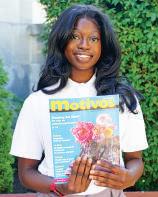
Zigglhi
“It showed that young people have all the answers. We just have to facilitate and create the space for you to feel safe enough to explore.”
~F. Christopher Goins, President of Girard College
What was really good is that we recognized, although we came from very different backgrounds, we were able to build solidarity around similar concerns, similar issues that were impacting all of us in some way.”
~ Mr. Clough, Girard’s eleventh and twelfth grade history teacher
:: ION v LA VIDA motivos 8
Photography courtesy of Girard College
Estudiantes y docentes unidos en la defensa de sus intereses


Nuestro curso senior se levantó en armas. Aunque expresábamos nuestras preocupaciones a los profesores, nos sentíamos sin poder sobre las condiciones en las que nos encontrábamos. Los lugares de trabajo eran inadecuados y las salas de estudio demasiado infrecuentes, los códigos de vestimenta resultaban invasivos y al menú de comidas le faltaba variedad. Tras unos meses dando vueltas, tomé la iniciativa de reunirme con el Sr. Goins, el presidente del Girard College, nuestro internado de Filadelfia, para hablar de la vida estudiantil.
Lo mejor fue que nos dimos cuenta de que, aunque veníamos de entornos muy diferentes, pudimos solidarizarnos en torno a causas similares, problemas parecidos que nos afectaban a todos de alguna manera
~ Sr. Clough, profesor de Historia de undécimo y duodécimo grado en Girard
Cuando nos sentamos, me sorprendió al compartir un recuerdo preciado sobre el compromiso cívico de sus alumnos respecto de un funcionario electo. En 2005, cuando el presidente Goins era profesor de AP para el gobierno estudiantil, hacía que cada día sus alumnos leyeran las noticias y encontraran un artículo pertinente sobre el que escribir. Fue entonces cuando los estudiantes descubrieron que un funcionario electo, Billy Yow, de Greensboro, Carolina del Norte, vendía camisetas con la imagen de un niño blanco sobre una bandera confederada al fondo, orinando sobre el escudo de la NAACP. Los estudiantes estaban furiosos, escandalizados de que alguien con ese cargo se comportara de esa manera. Para el resto del período de clases, idearon un plan de acción: irían a la reunión de comisionados del condado y confrontarían a Billy Yow.
Demostró que los jóvenes tienen todas las respuestas. Solo tenemos que generar y facilitarles el espacio para que se sientan seguros de explorar
~F. Christopher Goins, presidente del Girard College
Colectivamente, los estudiantes dominaron los 30 minutos concedidos a la audiencia, impidiendo toda desviación de su causa. La CNN cubrió la noticia y, finalmente, Yow fue apercibido. Tiempo después,
renunció. El Sr. Goins lo describe como uno de sus recuerdos favoritos porque "demuestra que los jóvenes tienen todas las respuestas. Solo tenemos que generar y facilitarles el espacio para que se sientan seguros de explorar". La reunión me dio esperanzas para seguir planteando las preocupaciones de nuestro curso senior.
Otro profesor nos alentó aún más compartiendo su experiencia en la primera línea del activismo juvenil. El Sr. Clough, profesor de Historia de undécimo y duodécimo grado en Girard, contó que en 2007, cuando estudiaba en la CUNY, participó de una toma estudiantil de la NYU. Fue al principio de la recesión, y los estudiantes estaban formando una coalición con los de la NYU y Columbia. El Sr. Clough dijo: "Lo mejor fue que nos dimos cuenta de que, aunque veníamos de entornos muy diferentes —los chicos de Columbia y de la NYU pagaban mucho más de matrícula y en general provenían de familias más acomodadas que los de la CUNY, que éramos todos de clase trabajadora o pobres—, pudimos solidarizarnos en torno a causas similares, problemas parecidos que nos afectaban a todos de alguna manera".
Alentados por eso, con mis compañeros continuamos elevando nuestros reclamos. Nos reunimos con asesores residentes y exalumnos. Con el tiempo, nuestras necesidades se fueron incorporando a las nuevas políticas, y las cosas mejoraron. Ha habido un notable esfuerzo por parte de los administradores residenciales y académicos por escuchar a los estudiantes e implementar cambios. Para empezar, ahora hay salas de estudio al menos dos veces por semana, y tenemos más bocadillos. Parece poco, pero es un comienzo.
Aunque no me gusta el gradualismo y preferiría que las cosas avanzaran más rápido, me doy cuenta, en especial por los relatos de nuestro presidente y nuestro profesor de Historia, de que hay poder en la formación de coaliciones fuertes: cuando nos unimos para alzar la voz, el cambio es posible.
motivos 9
Girard College students recently advocated for changes in dress code, food options and frequency of study halls.
FASHION ADVOCACY:
HOW TEENS USE STYLE TO SPEAK OUT
Compiled by the Motivos team
Jose Ramos, a seventeen-year-old student from Sofia Academy in Philadelphia, PA, and a multi-year participant in Taller Puertorriqueño’s Youth Artist Program (YAP), says you need to keep smiling to get through the pain—the t-shirt he created for Taller’s El Fashion Show encourages wearers and observers to do just that. Last spring, he tried his hand at different design techniques before settling on airbrush to prototype his smile-with-a-pocket shirt, which he also modeled in Taller’s spring 2022 fashion show.
Jose hopes his fashion sparks conversation and connection to safeguard mental health. “Many don’t see mental health as physical, but it can become physical if it’s not paid attention to. I want it to be in conversation,” he says. “The smiley face on my shirt is to encourage others. There are many that care.”
He and other youth in the Youth Artist Program most recently worked with Program Director Ashleen Castillo on a mural to grace the walls of the YAP computer room. They also created a coloring book that focuses on mental health. Now they’re gearing up for El Fashion Show 2023 on May 19. Youths can get involved by signing up for YAP.
Get involved! Taller’s Youth Artist Program offers:
• Sewing and textiles



• Fashion design
• Painting and drawing


• Graphic design & typography
• Sculpture and 3D art
Go to https://tallerpr.org/ for more details.
Across the country in Montana, just outside Crow Reservation, students from Hardin High School pulled off their first Indigenous Fashion Show during Native American Heritage Month in November and are currently preparing for a spring 2023 show. The Motivos youth team hosted student participants on our Team Talk segment via Zoom to learn more.
A TikTok video took students instantly from casual wear to model ready. The fashion show featured white pillars that resemble sculpted ice in stark contrast with a black backdrop behind
What messages are you sending out to the world through the art you create and the fashion you wear? Explore what youth at Motivos, Taller Puertorriqueño and Hardin High School are up to:
Motivos: @motivosmag

Taller YAP: @yaptallerpr
Hardin High School Bulldogs: https://bit.ly/HardinHS

the stage. Student models were the bright spots, wearing colorful cloth ing made by local Native designers like Della of Apsaalooke Designs. Traditional patterns and ribbon work held their own on contem porary clothing cuts, bridging generations and carrying mes sages forward through time. “I use a lot of our Crow culture as inspiration but bring it to con temporary times whereas you can wear it in the street. I like to embellish, I’m an accessory person, I add to Della’s styles,” historian and artist Rose William son of Lady Pompadour told us. She was glad be a part of the show, and to expose youth to art and fashion as a way of life and as a business.
“I felt important modeling cloth ing that exhibited my culture,” Angel Little Head, a twelfth-grader, said. Likewise, tenth grade student Day vany Whiteman Runs-Him told vos, “It felt empowering modeling my culture through modern fashion.”
The next project students at Hardin High School shared with on the Missing and Murdered Indigenous Women (MMIW) movement to bring attention to crimes perpetrated against women and girls from Indigenous communities nationwide. While many of our readers associate Cinco de Mayo with celebration, in 2017, Montana senators introduced a resolution recognizing May 5 as the National Day of Awareness for Missing and Murdered Native Women and Girls. Red is worn to break the silence and demand a crisis mode response from the government to investigate these crimes immediately.

Jose reminds us of the power of fashion: “Others can tell who you are by what you wear. That doesn’t define you as a human, but it does send a message.”
Catch a peek of Ren Wadsworth’s coverage of Hardin High School’s Indigenous Fashion Show on NonStop Local here:
ION v LA VIDA
::
AND
motivos 10
Hardin High School student model Angel Little Head with Della Big Hair Stump of Designs by Della at Hardin High School’s first Native Fashion Show in November, 2022.
Modelando un mundo mejor
José Ramos, estudiante de 17 años de la Sofia Academy de Filadelfia (Pensilvania) y participante desde hace varios años del Programa de Jóvenes Artistas (YAP) del Taller Puertorriqueño, dice que para superar el dolor hay que seguir sonriendo: la camiseta que creó para El Fashion Show del Taller alienta quienes la usan y la ven a hacer precisamente eso. La primavera pasada probó diferentes técnicas de diseño antes de decidirse por la aerografía para crear el prototipo de su camiseta de bolsillo sonriente, que también lució en el desfile del Taller la primavera de 2022.
José desea que su moda dispare conversaciones y conexiones para proteger la salud mental. "Muchos no ven la salud mental como algo físico, pero puede llegar a serlo si no se le presta atención. Me gustaría que se hable de ello", afirma. "La cara sonriente de mi camiseta es para animar a los demás. Muchas personas se preocupan por ti."
José y otros integrantes del Programa de Jóvenes Artistas han trabajado recientemente con su directora, Ashleen Castillo, en un mural para embellecer las paredes de la sala de computación del YAP. También crearon un libro para colorear centrado en la salud mental. Ahora se preparan para El Fashion Show 2023 del 19 de mayo. Los jóvenes que lo deseen pueden participar del evento anual inscribiéndose en el YAP.
¡Participa! El Programa de Jóvenes Artistas del Taller ofrece:
• Costura y textiles

• Diseño de moda

• Pintura y dibujo
• Diseño gráfico y tipografía
• Escultura y arte 3D
Visita https://tallerpr.org/ para obtener más información.
Al otro lado del país, en Montana, a las afueras de la reserva Crow, los alumnos de la secundaria Hardin organizaron su primer desfile de moda indígena durante el mes de la Herencia Nativa Americana en noviembre, y actualmente preparan un desfile para la primavera de 2023. Para conocer más, el equipo de jóvenes de Motivos recibió a estudiantes que participaron de esta experiencia en nuestro segmento Team Talk a través de Zoom.
Bastó un video de TikTok para transformar instantáneamente a los estudiantes en modelos. El desfile contó con pila-
res blancos que parecían hielo esculpido, en contraste con un fondo negro detrás del escenario. Los modelos fueron los puntos salientes, luciendo coloridas prendas confeccionadas por diseñadores nativos locales como Della de Apsaalooke Designs. Los diseños tradicionales y el trabajo con cintas se combinaron con prendas de corte contemporáneo, tendiendo puentes entre generaciones y transmitiendo mensajes a través del tiempo.
"Me sentí importante modelando ropa que mostraba mi cultura", dice Angel Little Head, estudiante de duodécimo grado. Del mismo modo, Dayvany Whiteman Runs-Him, estudiante de décimo grado, cuenta a Motivos: "Sentí un empoderamiento al mostrar mi cultura a través de la moda actual".

El siguiente proyecto que los alumnos de la secundaria Hardin compartieron con nosotros se centra en el movimiento Mujeres Indígenas Desaparecidas y Asesinadas (MMIW, por sus siglas en inglés) para llamar la atención sobre los crímenes perpetrados contra mujeres y niñas de comunidades indígenas de todo el país. Aunque muchos de nuestros lectores asocian el 5 de Mayo con la celebración, en 2017 los senadores de Montana introdujeron una resolución que establece la fecha como el Día Nacional para el Reconocimiento de las Mujeres y Niñas Nativas Desaparecidas y Asesinadas. Se viste de rojo para romper el silencio y exigir al gobierno una respuesta a la altura de la crisis que representan estos crímenes, para investigarlos con urgencia.


José nos recordó el poder de la moda: "Los demás pueden saber quién eres por lo que llevas puesto. Eso no te define como ser humano, pero transmite un mensaje."
Diseñadores en el primer desfile de moda indígena de la secundaria Hardin
Apsaalooke Designs by Della
Lady Pompadour by Rose Williamson
Plains Soul by Carrie Moran-McCleary Sweet Sage Woman by Yolanda Good Voice
Jose Ramos models his smilewith-a-pocket shirt on the runway at Taller Puertorriqueño’s spring ’22 fashion show.
Left: Beaded accessory by Rose Williamson of Lady Pompadour. Right: Student Aiyanna Big Man models a royal blue velvet bustier, lace and ribbon pencil skirt and Apsáalooke geometric floral beaded necklace set designed by Rose Williamson of Lady Pompadour.
Photo of Jose by Tony Rocco, of Angel by Adora Tsosie Big Hair, others courtesy of Rose Williamson
‘Paranoid’ by Jose Ramos.
motivos 11
‘Depression’ by Jose Ramos.
LIGHTS, CAMERA, EMPOWERMENT: Motivos Summer Video Camp

 By Ramses Montes
By Ramses Montes


Throughout July and August 2022, I had the immense privilege of being the film instructor for Motivos Summer Video Camps held at McVeigh Recreation Center and McPherson Library in Philadelphia, PA. During this time, I recognized how important the efforts of the rec center and library staff are and how much the environment of the neighborhood impacts these kids. Caring adults, camaraderie of peers, and multiple options for enrichment activities in this under-resourced, violenceplagued area created bright spots for us all.
I want to push you to think about how vital youth programming can be and consider not only where kids would be without these camps and workshops, without people in the community that legitimately care about them and want to reach out to improve their lives, but also what and how you can contribute time, talent or treasure to improve outcomes and brighten the lives of kids.
There are more than 400 neighborhood parks, recreation centers, and libraries in Philadelphia that serve as safe spaces for people to learn, play, exercise, and get access to important services. However, about 90 percent of these places are in need of investment. McVeigh Recreation Center will soon be renovated, and I’m very excited to see how these renovations will impact and improve the lives of the surrounding community. A big shout out to IMPACT Services, Rebuild Philadelphia, and the Free Library of Philadelphia for your contributions in making these summer programs and pending facility improvements possible.
Find additional resources and on-going programming here:
IMPACT Services: https://www.impactservices.org/



This organization mobilizes people and resources to create connected, resilient, thriving communities and help advance equity in Kensington and across Philadelphia.
Rebuild Philadelphia: https://www.phila.gov/programs/ rebuild/



Made possible by the Philadelphia Beverage Tax, Rebuild is investing hundreds of millions of dollars in improving neighborhood parks, recreation centers, and libraries in Philadelphia.
The Free Library of Philadelphia: https://www.freelibrary.org/
This privately/publicly funded network of 55 branch libraries sees over 6 million visitors per year and acts as a hub to advance literacy, guide learning, and inspire curiosity. Their Literacy Enrichment Afterschool Program (LEAP) provides STEAM activities and offers homework assistance in-person during library hours and live tutoring through Homework Help Online from 10:00 a.m. to midnight, 7 days a week.
:: ION v LA VIDA
Photography courtesy of Motivos magazine Watch the short films created by the campers!/ Mira los cortometrajes creados por jóvenes que participaron en el Campamento de Video Motivos aquí: https://bit.ly/MotivosSummerCamps POWERED BY www.impactservices.org
Later on, we were joined by Vanessa and Paris. Here participants watch a film on urban farming I produced.
motivos 12
Starting on our first day of class, I had no idea what to expect here at McVeigh Recreation Center, teaching a workshop to Kimara, Jaydalee, and Malia, our first three video camp participants.
¡LUCES, CÁMARA, MOTIVOS!
Campamento de Verano Video
Durante julio y agosto de 2022 tuve el inmenso privilegio de enseñar cine en el Campamento de Verano Motivos Video que se llevó a cabo en el centro recreativo McVeigh y en la biblioteca McPherson de Filadelfia, PA. Allí conocí lo importante que es el esfuerzo del personal de estas instituciones y cuánto afecta a los niños el ambiente del vecindario. El afecto de los adultos, la camaradería entre pares y las múltiples opciones de actividades enriquecedoras en esta zona de escasos recursos y plagada de violencia fueron iluminadores para todos.

Quiero alentarte a pensar en lo vital que pueden ser los programas para los jóvenes y considerar no solo dónde estarían los niños sin estos campamentos y talleres, sin personas en la comunidad que legítimamente se preocupan por ellos y quieren ayudarlos a tener una vida mejor, sino también qué y cómo puedes aportar con tu tiempo, talento o dinero para mejorar los resultados y alegrar la vida de los niños.
Hay más de 400 parques, centros recreativos y bibliotecas barriales en Filadelfia que funcionan como espacios seguros para aprender, jugar, hacer ejercicio y acceder a servicios fundamentales. Sin embargo, alrededor del 90 por ciento de ellos necesitan fondos. El centro recreativo McVeigh pronto será renovado, y me emociona ver cómo esto impactará para mejorar la vida de la comunidad que lo rodea. Muchas gracias a IMPACT Services, Rebuild Philadelphia y la Biblioteca Pública de Philadelphia por su contribución para hacer posibles estos programas de verano y las mejoras pendientes.
About the Author
Ramses Montes is a Philadelphiabased writer, musician and filmmaker. Their work centers around food security and community-building. In their free time they like to read, stretch and play video games.

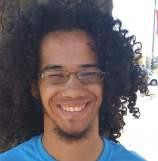
 Aquí vemos a Chizick Agüero dirigiendo un rompehielos activo para que los estudiantes de McPherson empezaran a percibir las cosas de otra manera y a comunicar sus ideas con claridad.
McPherson es un espacio vibrante y activo, y nos facilitaron mucho las cosas su amable y servicial personal y los numerosos recursos disponibles.
Aquí vemos a Chizick Agüero dirigiendo un rompehielos activo para que los estudiantes de McPherson empezaran a percibir las cosas de otra manera y a comunicar sus ideas con claridad.
McPherson es un espacio vibrante y activo, y nos facilitaron mucho las cosas su amable y servicial personal y los numerosos recursos disponibles.
motivos 13
El primer día en McPherson hicimos una introducción al campamento y mostramos trabajos de los dos instructores del taller: Jenée Chizick Agüero (la fundadora de Motivos) y yo.
INSPIRATION IN OUR COMMUNITY
How Higher Education Helped Me Shatter the Glass Ceiling
By Gregory Mowle Gregory Mowle

Growing up as the first-born son, cousin, and grandchild, my family’s expectations were high from the very beginning. Born in Elizabeth, NJ, to a Bolivian immigrant mother and an American father, I was the first child of my generation to bridge the gap between both cultures. Hard work was a core value in my family, so when I hit glass ceil ing after glass ceiling in my professional life, I knew I could find a way to overcome it. Higher education and the Army ROTC program have fulfilled my desire for career advancement and community service, bringing me into a new and exciting future.
But I didn’t always see it that clearly. Upon completion of high school in 2012, I wasn’t entirely sure which profession I wanted to pursue. I worked at an office supply retail store, and by the age of 20 became the youngest promoted to manager within the district. Proud of this accomplishment, I strived to advance even further, climbing the managerial ladder and progressing into upper management within four years.
I would eventually hit a glass ceiling, unable to proceed without a higher degree. So, I switched fields and became a manager for a fitness center, but I would be held back yet again for the same reason. It was clear that higher education would be my ticket to advancement; after nearly seven years of full-time employment, I decided to return to school.
I entered Union County College with a new mentality. Once I earned my associate's degree, I wasted no
Title: Master of Social Work Candidate, Army ROTC Cadet


Age: 28
Born In: Elizabeth, NJ Union, NJ
Bolivian American Master of Social Work candidate, specializing in Management and Policy, Rutgers University, New Brunswick, Class of 2024; Bachelor’s degree in Sociology with a 3.96 GPA, summa cum laude, Kean University, 2021; Associate degree in Science, Union County College, 2019; Union High School, 2012.
Extracurricular Activities and/or volunteer work: Executive Officer (XO), serving as Chief of Staff for the Scarlet Knight Battalion/Rutgers Army ROTC program; Team Captain of the Army ROTC Queens Guard/ Color Guard; member of Scabbard and Blade Military Honor Society, maintaining 4.0 GPA; member of Caporales San Simón La Paz, a Bolivian dance group.
Future Goal: Enter active duty in the Army as a Medical Service Corps Officer or as an Adjutant General Officer.


Inspiration: Making my younger self proud; using failure as a building block for success.


Favorite Quote: “Do or do not. There is no try”
– Yoda (Star Wars Episode V: The Empire Strikes Back) How to Connect: Gmowle0812@gmail.com; https://www.linkedin.com/in/gregory-mowle
time and attended Kean University, pursuing a bachelor's degree in sociology. After just a year and a half, I graduated in the top 10% of my class with a 3.9 GPA, earning the title summa cum laude, the highest distinction of honors.
It was clear
would be my ticket to advancement; after nearly seven years of full-time employment, I decided to return to school.
Although I completed my degree, I was not yet ready to re-enter the workforce. Throughout my education, I developed a passion for personal growth and unlocking one’s inner potential; no matter one’s background, I truly believe everyone can become successful. I knew I had more to give back to my community, so I sought the Army.

:: p v LA VIDA
Photography courtesy of Gregory Mowle
that higher education
CDT Mowle giving a thumbs up during a tactics lab at Kilmer Woods.
motivos 14
CDT Mowle leading Army ROTC Queens Guard off field before a Rutgers football home game.
After speaking to a recruiter with the Army ROTC program, I realized this was the missing puzzle piece in my life—this would be the route I would take through the rest of my education. In addition to joining the ROTC program at Rutgers, I decided to pursue a Master of Social Work, committing myself to furthering my education and enhancing my beliefs in the concept of “inner potential”, hoping to one day influence those around me.
Now, I’m in the final year of my Master of Social Work program, specializing in Management and Policy at Rutgers University and aspiring to enter active duty as a Medical Service Corps Officer or as an Adjutant General Officer.

After 28 years of life lessons, I reflect on my past experiences—I’m humbled by the opportunities bestowed upon me and excited for the journey that awaits. I plan on making the Army a career, hoping to one day share my story with others. Everyone can succeed; it’s just a matter of how hard you are willing to work to accomplish your goals.
EN NUESTRA COMUNIDAD
a

Al ser primer hijo, primo y nieto, mi familia siempre puso altas expectativas en mí. Nacido en Elizabeth, NJ, de madre bolivi ana y padre estadounidense, fui el primero de mi generación en cerrar la brecha entre ambas culturas. El trabajo era un valor fundamental en mi familia, así que cuando choqué contra un techo de cristal tras otro en mi vida profesional, supe que encontraría la manera de superarlo. Gracias a la educación superior y al programa ROTC del Ejército cumplí mi deseo de progresar en mi carrera y servir a mi comunidad, avan zando hacia un futuro nuevo y emocionante.
Pero no siempre lo vi tan claro. Al terminar la secundaria en 2012 no estaba del todo seguro de qué carrera quería seguir. Trabajé en una tienda de artículos de oficina, y a mis 20 años me convertí en el gerente más joven del distrito. Orgulloso de ese logro, me esforcé por avan zar aún más, subiendo la escalera gerencial hacia la dirección a lo largo de cuatro años.
Estaba claro que la educación superior sería mi boleto para progresar, así que tras casi siete años de trabajar a tiempo completo, decidí volver a estudiar.
Hasta que un día choqué con un techo de cristal, insuperable sin un título superior. Entonces cambié de campo y pasé a ser gerente de un gimnasio, pero la misma razón me impedía avanzar. Estaba claro que la educación superior sería mi boleto para progresar, así que tras casi siete años de trabajar a tiempo completo, decidí volver a estudiar. Ingresé al Union County College con una nueva mentalidad. Una vez que obtuve mi no perdí el tiempo y asistí a la Universidad de Kean para obtener un bachelor's degree en Sociología. Apenas un año y medio después, me gradué en el 10% superior de mi clase, con un GPA de 3,9, y obtuve el título summa cum laude, la más alta distinción.
Aunque había terminado la carrera, aún no estaba listo para reincorporarme al mundo del trabajo. A lo largo de mi educación, desarrollé una pasión por el crecimiento personal y el desbloqueo del potencial interno; no importa de dónde provengas, creo que todos pueden tener éxito. Sabía que tenía más para devolver a mi comunidad, así que busqué al Ejército.
Después de hablar con un reclutador del programa ROTC del Ejército me di cuenta de que esa era la pieza que faltaba en el rompecabezas de mi vida: esa sería la ruta por la que seguiría el resto de mi formación. Además de unirme al programa ROTC en Rutgers, decidí seguir una maestría en Trabajo Social, comprometiéndome a continuar mi educación y desarrollar lo que creía con respecto al concepto de "potencial interno", con la esperanza de algún día influir en quienes me rodean.
Ahora curso el último año de la maestría en Trabajo Social, especializándome en Gestión y Políticas en la Universidad de Rutgers y aspirando a entrar en servicio activo como oficial del Cuerpo de Servicio Médico.
Sabía que tenía más para devolver a mi comunidad, así que busqué al Ejército.
Tras 28 años de lecciones de vida, reflexiono sobre mis experiencias pasadas: me honran las oportunidades que me han brindado y me emociona el recorrido que me espera. Quiero hacer del ejército mi carrera, con la esperanza de algún día compartir mi historia con otros. Todos pueden triunfar; es solo una cuestión de cuánto estás dispuesto a trabajar para lograr tus objetivos.
INSPIRACIÓN
Cómo me ayudó la educación superior
romper el techo de cristal
I knew I had more to give back to my community, so I sought the Army.
CDT Mowle in Caporales uniform after performing with the Bolivian dance group in the Bergenline Hispanic Day Parade in North Bergen, NJ.
motivos 15
LTC Cortez, Professor of Military Science and CDT Mowle before presenting colors at a Rutgers home football game.
Screenagers
and Our Twisted Media Minds
By Delaney Sill


Falling down the endless rabbit hole of my feed, my phone constantly shines unrealistic life and body ideals into my sight, crafting insecurities I didn’t know I had. Social media carries so much weight today, and I feel obliged to comply with its standards and uphold my image. But the innocent fun that I used to seek in it has quickly turned toxic due to scroll after scroll of false imagery, helping to nurture a plethora of unhealthy habits that more people should be aware of. Even if the millions of other screenagers and I are aware of the tampered state of these images, according to PsychologyToday.com, Charlotte Markey expresses how nine out of ten times, comparison is still “a sort of weakness that reason can’t prevent.” My mind can’t help but be influenced by it, which only aids in the plummeting of my respective self-esteem. Hannah Nichols validates this in MedicalNewsToday.com, explaining how “Many studies have observed that more time spent on social media is associated with an increased risk of loneliness and depression…” A HuffPost report by Clarissa Silva concluded that “60% of people who use social media reported that it has impacted their self-esteem in a negative way.”
Personally, I admit to depending on validation from others to feel more confident. That, the overwhelming urge to edit my pictures, and the constant comparison of myself to the people I see on my screen all contribute to my feelings of self-worth as a human being.
Falling down the endless rabbit hole of my feed, my phone shines these unrealistic life and body ideals into my sight, crafting insecurities I didn’t know I had.
About the Author




Delaney Sill is a member of the Motivos team and a senior at Lower Merion High School in Pennsylvania. She enjoys binging TV series, spending time outdoors, and writing about her passions. She plans to attend college next fall to study psychology and learn more about the human mind and our behaviors.

I am tired of the toxicity of the media, and I know I am not alone. If only I could extract the wish of being good enough from my conscience rather than allowing these thoughts to become my reality. It is infuriating to experience and witness the negative ripple of social media, yet it inspires me to know that I can do more.
Here’s how:
FACE is a technique created by Professor Charlotte Markey of Rutgers University that really stood out to me while researching ways to change attitudes towards social media. Filter suggests we should filter what we look at so we aren’t exposed to triggering images. Avoid reminds us to stay away from harmful images. Careful Comparisons reminds us to stop comparing ourselves to others. And Evaluate encourages us before we begin downgrading ourselves.
It isn’t easy to crawl out of the dark hole that social media can be. As a social media addict, I know how it feels to be in too deep. So in my attempt to encourage realism on social media, I will only post unedited photos and encourage others to do the same. I hope this attitude can become more mainstream and that teens can start to feel more confident and beautiful in their own skin. Social media is just a highlight reel, but I think being your raw, vulnerable self is what truly makes a great highlight to those who see it.
::v LA VIDA
I am tired of the toxicity of the media, and I know I am not alone.
ilter void areful Comparisons valuate F A C E motivos 16 motivos 16
Bajando por el abismo de mi feed, constantemente el teléfono me arroja ideales irreales de vida y cuerpo, creándome inseguridades que no sabía que tenía. Las redes sociales tienen mucho peso en el presente y me siento en la obligación de cumplir con sus estándares y sostener mi imagen. Pero la inocente diversión que solía buscar en eso rápidamente se ha vuelto tóxica por el desplazamiento interminable de imágenes falsas que ayudan a fomentar una plétora de hábitos poco saludables de los que más personas deberían ser conscientes.

Incluso si los millones de otros screenagers entre los que me encuentro somos conscientes de la manipulación que hay en esas imágenes, según PsychologyToday.com, Charlotte Markey expresa cómo nueve de cada diez veces, la comparación sigue siendo “una especie de debilidad que la razón no puede evitar”. Mi mente no puede evitar ser influenciada por eso, lo que solo ayuda a la caída en picada de mi autoestima. Hannah Nichols lo valida en MedicalNewsToday. com, al explicar que “muchos estudios han observado que pasar más tiempo en las redes sociales está asociado con un mayor riesgo de soledad y depresión”. Un informe del HuffPost de Clarissa Silva cuenta que “el 60% de las personas que usan las redes sociales informaron que estas han afectado su autoestima de manera negativa”.
En lo personal, admito que dependo de la validación de los demás para sentir más seguridad. Eso, la abru-

madora necesidad de editar mis fotos y compararme constantemente con las personas que veo en mi pantalla contribuyen a mi autovaloración como ser humano.
Ya no soporto la toxicidad de las redes y sé que no solo me pasa a mí. Si tan solo pudiera extraer de mi conciencia el ansia de estar a la altura en lugar de permitir que esos pensamientos se conviertan en mi realidad... Es exasperante ver y experimentar la onda negativa de las redes sociales, pero me inspira saber que se puede hacer algo al respecto.


Esto es lo que se puede hacer:



La técnica FACE, creada por la profesora Charlotte Markey de la Universidad de Rutgers, me llamó mucho la atención mientras investigaba cómo cambiar la actitud hacia las redes sociales. Filtrar sugiere que deberíamos filtrar lo que vemos para no estar expuestos a imágenes que produzcan malestar. Apartar nos recuerda mantenernos alejados de las imágenes dañinas. Tener Cuidado al comparar es dejar de compararnos con los demás. Y Evaluar nos alienta a no menospreciarnos.
Pasamos a ser cuerpos indocumentados, fácilmente controlables y abusados.
No es fácil salir del agujero negro que pueden ser las redes sociales. Como alguien con una adicción a las redes, sé lo que es estar demasiado adentro. Por eso, en un intento por fomentar el realismo en las redes sociales, solo publicaré fotos sin editar y alentaré a los demás a hacer lo mismo. Espero que esta actitud se vuelva masiva y que los adolescentes puedan empezar a sentirse más seguros y hermosos en su propia piel. Las redes sociales son apenas una selección destacada de imágenes, pero creo que ser tu yo crudo y vulnerable es lo que en verdad te destaca a los ojos de quienes lo ven.
:: ::xCAREER EXPLORATION v LA VIDA
motivos 17
Illustration by Isaac Rivers, freshman, Temple University, Philadelphia, PA
iltrar partar uidado al comparar valuar F A C E
Bajando por el abismo de mi feed, el teléfono me arroja ideales irreales de vida y cuerpo, creándome inseguridades que no sabía que tenía.
How to Advocate for Your Needs within a Relationship
By Jessy Sandoval-Barrett, MD


Question:

How can I advocate for my needs in a way that does not sound like complaining and inspires action?

You’ve heard the saying many times in different scenarios: It takes two to tango. Of course, people are not talking about the Argentinian dance specifically, but the fact that dancing it well requires a fundamental need to understand, communicate, and respond to your partner. This holds very true in relationships where two people have chosen to spend time together.


But how do we let our partner know what we like? How will they understand when we need something different? Here is where we advocate for ourselves.
Advocacy is a skill that comes naturally to us as babies. We cry to let parents and caretakers know we are hungry, cold, or wet. As we develop verbal abilities, we are taught to “use our words” to meet our needs. The clearer we make our request (“Can I have more ice cream?” or “Can I go over to the neighbor’s house after school?”), the more likely our request will be heard.
In a relationship, two people must learn how to express and communicate their needs. Discuss your partner’s preferences, share your own, and arrive at some agreement.
For example, if you prefer your partner to commu nicate via video call rather than texting, share this with them. Maybe you prefer they call you after—not during—work. You will need to let them know this. How often you get in touch, the gatherings you attend together, and the types of outings you prefer are just some areas where you will likely need to voice your preferences.
Advocating for what you prefer by discussing and supporting your choices is an important step.
You can try using phrases like, “I understand you really like x, but I’d prefer y. It’s important to me because z. I would really appreciate your support in this.”
We all grow through our relationships, and learning to communicate our needs to each other will enhance this beautiful experience.
Cómo defender tus necesidades en una relación
Pregunta:
¿Cómo puedo defender mis necesidades de un modo que no suene a queja e inspire una acción?
abrás oído el dicho muchas veces en diferentes escenarios: Para bailar el tango hacen falta dos. Por supuesto, no se trata en concreto del baile argentino, sino del hecho de que para bailarlo bien es imprescindible entender a tu pareja y comunicarte con ella. Esto es muy cierto en las relaciones en las que dos personas han decidido pasar el tiempo juntas.
Pero, ¿cómo hacemos saber a nuestra pareja lo que nos gusta? ¿Cómo entenderán cuando necesitemos algo diferente? Aquí es donde defendemos nuestras necesidades.
Defender lo nuestro es algo que nos sale de forma natural cuando somos bebés. Lloramos para avisar a quienes nos cuidan que tenemos hambre, frío o estamos mojados. A medida que desarrollamos nuestras capacidades verbales, se nos enseña a "usar nuestras palabras" para satisfacer nuestras necesidades. Cuanto más claro sea nuestro pedido ("¿Puedo comer más helado?" o "¿Puedo ir a casa del vecino después de la escuela?"), más probabilidades tendremos de que sea escuchado.
En una relación, dos personas deben aprender a expresar y comunicar sus necesidades. Hablen sobre lo que prefiere tu pareja, cuenta lo que tú prefieres y lleguen a un acuerdo.
Por ejemplo, si prefieres que tu pareja se comunique por videollamada en lugar de textos, díselo. Quizá prefieras que te llame cuando terminas de trabajar, no mientras trabajas. Debes hacérselo saber. La frecuencia con la que se ponen en contacto, las reuniones a las que asisten juntos y el tipo de salidas que les gustan más son algunos de los aspectos en los que seguramente deban expresar sus preferencias. Defender lo que prefieres conversando e impulsando tus elecciones
Podrías usar frases como: "Entiendo que te guste mucho x, pero yo preferiría y. Es importante para mí porque z. Me encantaría que me apoyes en esto."
Todos crecemos en las relaciones, y aprender a comunicarnos nuestras necesidades mejorará esta hermosa experiencia.
About the Author


Jessy SandovalBarrett, MD, is a child and adolescent psychiatrist and Assistant Professor in Clinical Psychiatry at the University of Pennsylvania.

::v LA VIDA
motivos 18
Photography by Zebra Visual
a Moral
 By Jorge Arturo Agüero
By Jorge Arturo Agüero



Joke!
After my wife picked up our three-year-old son from his first day of Pre-K, she noticed that he wasn’t walking properly and seemed to be limping.

They arrived at home, and she asked him, “Is everything okay with your foot?”
He replied, “Yes.”
Without taking her eyes from the child, she watched as he removed a plastic caterpillar from his shoe (of a brand I can’t mention because they don’t compensate me). He’d brought it from his classroom tucked away in its secret hiding place.


I was surprised that my son didn’t want my wife to share this event with me when I got home. But she’d already told me of the travels of the caterpillar who wanted to explore the world by escaping in my son’s shoe. I couldn’t stop wondering how it may have occurred to that tiny brain that the shoe was the best place to conceal it.
Moral!
As a father, I always provide for my sons: love, advice, mentoring, and support through both good and bad times. Sometimes we think that allowing them to get something without our permission won’t impact their development, but these small deeds form the cornerstone of what it means to be a human being and should never be overlooked.


Coming from a three-year-old child, it may seem very sweet and funny, but we need to address these events immediately.
The next day at school, my son took his beloved caterpillar friend, returned it, and apologized for bringing him home without permission.
When we stand up for our values, we make a better world.
¡Chiste!
Cuando mi esposa recogió a nuestro hijo de 3 años de su primer día de pre-K, notó que él rengueaba al caminar. Al llegar a casa, le preguntó:
—¿Todo bien con tu pie?
Él respondió que sí.
Sin quitar los ojos del pequeño, mi esposa lo vio sacar de su sandalia de hule (de una marca que no paga auspicio) un gusano de plástico que había traído del aula.
Cuando llegué a casa me encontré con la sorpresa de lo que había hecho mi pequeñín, que de ningún modo quería que mi esposa me contara.
¡Moraleja!
Una vez que me enteré de la travesía del gusano que quería huir en una sandalia para explorar el mundo, no podía dejar de pensar en cómo se le había ocurrido al cerebrito de mi hijo que ese era el mejor lugar para ocultarlo.
Como padre, siempre trato de dar un buen consejo a mis hijos, amarlos, guiarlos y darles mi apoyo en los buenos y malos momentos. Muchas veces podríamos creer que dejarles apropiarse de algún objeto sin permiso no va a afectar su crecimiento, pero de ninguna manera hay que pasar por alto estos pequeños actos, que van contra la base de los valores del ser humano.
En un niño de 3 años puede parecer algo muy gracioso, pero hay que corregirlo inmediatamente.
Al día siguiente, mi hijo llevó de regreso a su querido amigo a clase y se disculpó por haberlo traído a casa sin permiso.
Defendamos nuestros valores y tendremos un mundo mejor. ¡Hasta la próxima!
:: ::xCAREER EXPLORATION v LA VIDA
with
motivos 19
Illustration by Yohel Agüero, age 26, tattoo artist, Cuidad Neily, Costa Rica; IG: @yohelagueroart
Immigrant and First-Gen College Student Finds Family, Funding, and Guidance to Navigate His Future

 By Xavier Garay
By Xavier Garay
Being both a first-generation immigrant and a first-generation college student has a set of challenges that may not be obvious from the outside. Growing up, I did not have the conventional lifestyle surrounded by family, as most of my family lived outside the country, and my parents had to work most of the day. Since neither of my parents went to school in the United States or attended college, it was difficult to find the right steps to take to ensure my academic and professional success. I was also unsure how I was going to pay for higher education.
Then I found out about the National Guard. They offered to pay for my tuition if I agreed to enlist and drill for one weekend a month and two weeks in the summer. Enlisting solved two of my problems: navigating my way through college and having a family nearby. The Army then provided me with the means to pay for college and offered support through their various programs to ensure I was academically successful. The only remaining thing I needed was the income to support my life outside of college. To that end, I talked to the Recruiting Operations Officer at the Rut-
gers Army ROTC program about a scholarship that could cover the rest of what I needed. This lifted the strain of worrying about finding employment and allowed me to focus on other ways to improve myself, like participating in several research projects and simply enjoying life.
Enlisting solved two of my problems: navigating my way through college and having a family nearby.
One of the worries I had about joining a program like the National Guard and ROTC was how it would interfere with my studies. However, I can honestly say that without the support of these programs, I would not be in the position I am today. Every semester, we need to submit a form with all the classes we took and plan to take, which must be signed by an advisor to confirm we are on track to graduate. Rutgers also allows military-affiliated students to register for classes before any other demographic, ensuring we get the classes that fit best with our schedule. If, after all this, there is still a conflict between courses or an opportunity, the ROTC program is willing to make accommodations to ensure our academic success.
The program even offers internship opportunities to enhance our professional success outside the military with partnerships through several organizations, such as the FBI, Army Medical Command, and Massachusetts Institute of Technology Lincoln Laboratory, which I participated in as an engineering intern. These organizations have a specific number of slots offered to cadets from around the country in a variety of professions, including cybersecurity, engineering, medicine, history, and more. Community service is also a big deal in our program, which is why we volunteer around Rutgers University wherever they need us and run annual food drives for the local community.
After I graduate, I will remain in the National Guard and plan to stay for 20 years while maintaining a civilian career in research and development. I also plan on attending graduate school to pursue a PhD in Mechanical Engineering. I hope to one day carry these experiences forward to become a leader in the engineering field, potentially motivating others from similar backgrounds to actively pursue their goals.
LEADERSHIP SPOTLIGHT
Photography courtesy of Xavier Garay
The Army then provided me with the means to pay for college and offered support through their various programs to ensure I was academically successful.
motivos 20
Xavier with his niece, nephews and girlfriend at a Christmas party in Brooklyn, NY in 2021
Inmigrante y primer estudiante universitario de su familia encuentra un hogar, fondos y orientación para navegar su futuro
 Por Xavier Garay
Por Xavier Garay
Ser al mismo tiempo inmigrante y primer universitario de la familia conlleva una serie de desafíos que pueden no ser obvios desde afuera. De chico no tenía un estilo de vida convencional, junto a mi familia, ya que la mayoría de mis parientes vivían fuera del país y mis padres tenían que trabajar casi todo el día. Como ninguno de ellos estudió en los Estados Unidos ni fue a la universidad, me resultó difícil encontrar los pasos correctos para asegurar mi éxito académico y profesional. Tampoco sabía cómo iba a pagar mi educación superior. Luego conocí la Guardia Nacional. Me ofrecieron pagar mi matrícula si accedía a alistarme y entrenarme con ellos durante un fin de semana al mes y dos semanas en el verano. Alistarme resolvió dos de mis problemas: navegar mi camino universitario y tener una familia cerca. Luego, el Ejército me dio los medios para pagar la universidad y me ofreció apoyo a través de sus diversos programas para garantizar que me fuera bien. Lo único que me hacía falta era un ingreso para costear mi vida fuera de la universidad. Hablé con el oficial de operaciones de reclutamiento del programa ROTC del Ejército en Rutgers sobre la posibilidad de recibir una beca que cubriera el resto de lo que necesitaba. Esto eliminó la tensión de preocuparme por encontrar empleo y me permitió concentrarme en otras formas de mejorar, como participar en proyectos de investigación y simplemente disfrutar de la vida.
Alistarme resolvió dos de mis problemas: navegar mi camino universitario y tener una familia cerca.
Una de las cosas que me preocupaban de unirme a un programa como la Guardia Nacional y el ROTC era cómo interferiría con mis estudios. Sin embargo, sinceramente, sin el apoyo de estos programas no estaría en la posición en la que hoy estoy. Cada semestre debemos enviar un formulario con todas las clases que tomamos y planeamos tomar, y debe estar firmado por un asesor para confirmar que estamos avanzando en la carrera. Rutgers también permite
que los estudiantes afiliados a las fuerzas armadas se inscriban en las clases antes que otros, lo que nos garantiza la elección de los mejores horarios para nosotros. Si, a pesar de esto, sigue habiendo algún conflicto entre los cursos y una oportunidad, el programa ROTC está dispuesto a ser flexible para garantizar nuestro éxito académico.
Luego, el Ejército me dio los medios para pagar la universidad y me ofreció apoyo a través de sus diversos programas para garantizar que me fuera bien.
El programa incluso ofrece oportunidades de pasantías para mejorar nuestro éxito profesional fuera del Ejército en sociedad con distintas organizaciones, como el FBI, el Comando Médico del Ejército y el Laboratorio Lincoln del Instituto Tecnológico de Massachusetts, donde participé como pasante de Ingeniería. Estas organizaciones tienen un cupo específico para cadetes de todo el país en una variedad de carreras, como Seguridad Cibernética, Ingeniería, Medicina e Historia, entre otras. El servicio comunitario es fundamental en nuestro programa; por eso, participamos como voluntarios donde sea que nos necesiten en torno a Rutgers y realizamos colectas de alimentos anuales para la comunidad.
Después de graduarme, pienso seguir en la Guardia Nacional durante 20 años mientras mantengo una carrera civil en investigación y desarrollo. También quiero asistir a la escuela de posgrado para doctorarme en Ingeniería Mecánica. Espero algún día lograrlo para convertirme en un líder en el campo de la ingeniería y motivar a otras personas con historias como la mía a luchar por sus objetivos.

About the Author
POWERED BY
www.armyrotc.rutgers.edu
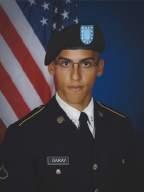
Xavier Garay is a senior at Rutgers University in New Brunswick, NJ working towards a BS in Mechanical Engineering. He was born in Santo Domingo, Domincan Republic. Garay covered the cost of his college degree and livelihood through the benefits provided by the Army ROTC program as a Simultaneous Membership Program (SMP) cadet.
 Xavier shown here with his Uncle Mario in Santo Domingo, Dominican Republic in 2018
Rutgers University Cadet Xavier Garay at basic training at Fort Leonard Wood, Missouri in 2019
Xavier shown here with his Uncle Mario in Santo Domingo, Dominican Republic in 2018
Rutgers University Cadet Xavier Garay at basic training at Fort Leonard Wood, Missouri in 2019
motivos 21
The Power of Accessible Education: A look


at Inter American’s new Philadelphia campus
 By Ramses Montes
By Ramses Montes



Are you interested in an accessible, affordable, culturally sensitive college experience? In today’s rapidly changing world, a bilingual, multinational college education can help propel your career more than ever while transforming people and communities. This deep knowledge of the inherent value of higher education led to the 1912 founding of the original Inter American Campus in San Germán, Puerto Rico, and the subsequent inauguration of their latest campus in Philadelphia, Pennsylvania.
Adjacent to Taller Puertorriqueño, Inter American’s new campus sits in the heart of Philadelphia’s Fairhill neighborhood, accessible to Philadelphia’s epicenter for Latine—specifically Puerto Rican—culture. With a per capita income that’s half the city’s average and double
the violent crime rate, this neighborhood has been gripped by poverty and urban decay. Still, it is replete with talented, driven people. According to Dr. Rafael Ramírez Rivera, Acting President of Inter American University, “Now to come to Taller, in the north of Philly, it’s like giving back to a community that has similar characteristics to where I lived. And to contribute to the education for this population, it’s very exciting; it’s very powerful.”
This inauguration and the first classes, which began in January 2023, are the result of years of perseverance and dedication from all parties. Dr. Carmen Febo, who was Taller’s executive director for twenty-two years up until the fall of 2021, offers stunning insight, stating, “I think when the president saw it, it clicked, the space clicked; the fact that Taller Puertorriqueño is
:: EXPRESSIONS ::pCOLLEGE REP ION v LA VIDA
With a per capita income that’s half the city’s average and double the violent crime rate, this neighborhood has been gripped by poverty and urban decay. Still, it is replete with talented, driven people.
motivos 22
Photography by Ray Valdez
Executive Director of Taller Puertorriqueño, Nasheli Ortiz, Acting President of Inter American University Dr. Rafael Ramírez Rivera and Board Chair of Taller Puertorriqueño Elena Marie DiLapi at the October 11, 2022 ribbon cutting.
smack in the middle of a Puerto Rican community, the kind of community they’re trying to support.” Over six years, Taller and Inter American worked hand in hand to bring their vision to fruition. Dr. Febo states, “The idea to reach out to Inter American, that credit has to be given to Edgardo González; he’s a board member at Taller.”
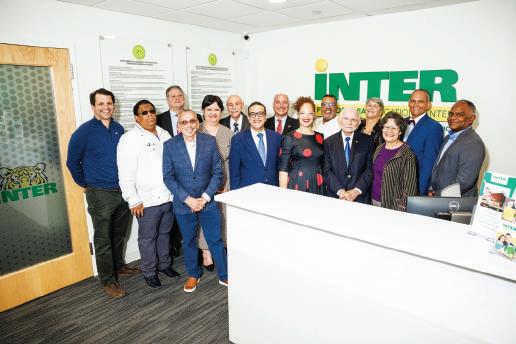

“The thing is, the big problem is that our students, the neighborhood kids, start studying in a university far from here. That comes out being very expensive, they have to travel to who-knows-where, and they start and don’t finish because they can’t,” González explained. “So I said, then why don’t we give them an education in their own neighborhood, a place where they can walk out the doors and see their community?” This idea led to the partnership with Inter American after a chance meeting at a gathering hosted by the Middle States Commission on Higher Education at Taller Puertorriqueño. “So it happened by complete coincidence that the Middle States Commission was hosting a meeting at Taller on the week of our new building’s inauguration in 2016, and all the Inter American staff was there.” The partnership persisted through logistical obstacles, hurricanes on the island, and the COVID-19 pandemic. At last, Inter American Philadelphia Education Center [IPEC] opened to the public on October 11, 2022.
Currently, the campus offers a Bachelor of Arts in Early Childhood Education: Preschool Level. At only $300 per credit, the campus provides bilingual delivery and comprehensive staff.

Katiann Figueroa, a local Kensington resident who plans to attain a degree in childhood education, said, “I’m excited to study in my community. It gives me a lot of hope, and I’m very enthused to start learning.” Indeed, Inter American is opening many doors for people who might not have previously considered pursuing this degree. Another prospective student, Belisa Robles de Jesus, said, “I feel like I’m back in Puerto Rico. I’m forty-seven years old, but it’s never too late.”
~ Edgardo Gonzalez
The campus aims to be a culturally comprehensive environment where students feel welcome to learn. “I hope that my students can be here and can be loud…and they can speak their language without it being judged or their intentions misinterpreted, and not always doubting themselves or proving themselves, giving them space to shine in other aspects,” adds Nasheli Ortiz, Executive Director of Taller Puertorriqueño, describing the atmosphere she hopes to create with Inter American at Taller.
About the Author

Ramses Montes is a Philadelphiabased writer, musician and filmmaker. Their work centers around food security and community involvement. In their free time they like to read, stretch and play video games.


So I said, then why don’t we give them an education in their own neighborhood, a place where they can walk out the doors and see their community?
I feel like I’m back in Puerto Rico. I’m forty-seven years old, but it’s never too late.
motivos 23
~ Belisa Roble
The partnership that resulted in Inter American University’s new branch campus at Taller Puertorriqueño began under the tenure of Taller’s former Executive Director, Dr. Carmen Febo San Miguel, pictured here speaking with Motivos.
Edgardo González, board member of Taller Puertorriqueño, shares with Motivos how he initially reached out to Inter American University regarding starting a new branch campus in North Philadelphia.
Executive Director of Taller Puertorriqueño, Nasheli Ortiz and Acting President of Inter American University Dr. Rafael Ramírez Rivera lead guests from Taller’s main building toward the adjacent entrance of Inter American University’s new Philadelphia campus.
Dr. Karen Woolcock Rodríguez, Acting Chancellor, Arecibo Campus of Inter American University addresses guests at the Inauguration Ceremony.
Inter American University and Taller Puertorriqueño personnel and politicians gather in the reception area following the ceremonial blessing of Inter American’s new branch campus.
El poder de una educación accesible:
una mirada al nuevo centro de estudios de la Universidad Interamericana en Filadelfia
Por Ramsés Montes
¿Te interesa una experiencia universitaria accesible, económica y culturalmente sensible? En un mundo tan cambiante como el actual, una formación universitaria bilingüe y plurinacional puede ayudarte a impulsar tu carrera más que nunca, y al mismo tiempo transformar personas y comunidades. Esta idea profunda sobre el valor inherente de la educación superior llevó en 1912 a la fundación del primer campus de Universidad Interamericana de Puerto Rico en San Germán (UIPR), y también a la inauguración de su más reciente campus en Filadelfia, Pensilvania
Adyacente al Taller Puertorriqueño, el nuevo campus se encuentra en el corazón del barrio Fairhill de Filadelfia, en contacto con el epicentro de la cultura latina —en especial puertorriqueña— de la ciudad. Con la mitad del ingreso per cápita que la media de la ciudad y el doble de delitos violentos, este barrio se ha visto atenazado por la pobreza y la decadencia urbana. Aun así, está repleta de personas talentosas y motivadas. Según el Dr. Rafael Ramírez Rivera, actual presidente de la Universidad Interamericana, "venir ahora al Taller, en el norte de Filadelfia, es como retribuir a una comunidad con rasgos similares a los de donde yo

vivía. Aportar a la educación de su población es muy emocionante, muy poderoso".
Con la mitad del ingreso per cápita que la media de la ciudad y el doble de delitos violentos, este barrio se ha visto atenazado por la pobreza y la decadencia urbana. Aun así, está repleta de personas talentosas y motivadas.
Esta inauguración y las primeras clases, que empezaron en enero de 2023, son el resultado de años de perseverancia y dedicación de todas las partes. La Dra. Carmen Febo, directora ejecutiva del Taller durante 22 años, sostiene: "Creo que cuando el presidente lo vio, hubo una conexión, el espacio era perfecto; el Taller Puertorriqueño estaba justo en medio de una comunidad puertorriqueña, el tipo de comunidad a la que se busca apoyar". Durante seis años, el Taller y la universidad trabajaron codo con codo para hacer realidad su visión. La Dra. Febo afirma: "El crédito por el contacto con la Universidad Interamericana corresponde a Edgardo González, miembro de la junta directiva del Taller".
"La cuestión, el gran problema, es que nuestros alumnos, los chicos del barrio, empiezan a estudiar en universidades lejos de aquí. Termina saliendo muy caro y tienen que viajar no se sabe adónde, por lo que empiezan y no pueden terminar", explica González. "Entonces me pregunté, ¿por qué no les proveemos educación en su propio barrio, en un lugar de donde salgan y
motivos 24
El personal de la Universidad Interamericana fuera de su nueva sucursal ubicada en Taller Puertorriqueño en el norte de Filadelfia.
Photography by Jenée Chizick Agüero and Ray Valdez
vean su comunidad?". Esta idea llevó a la asociación con la Universidad Interamericana tras un encuentro casual en una reunión organizada por la Middle States Commission on Higher Education en el Taller Puertorriqueño. "Dio la casualidad de que la Middle States Commission celebraba una reunión en el Taller la semana de la inauguración de nuestro nuevo edificio en 2016, y todo el personal de la universidad estaba allí." La Asociación persistió a pesar de los obstáculos logísticos y la pandemia de COVID-19. Finalmente, Inter Filadelphia Education Center (IPEC) abrió sus puertas al público el 11 de octubre de 2022. Actualmente, allí se ofrece un Bachillerato en Artes en Educación Infantil de Nivel Preescolar. A solo 300 dólares por crédito, el campus cuenta con enseñanza bilingüe y un completo equipo profesional. Katiann Figueroa, residente de Kensington en busca de un título en educación infantil, expresó: "Estoy emocionada de estudiar




aquí, en mi comunidad. Me da mucha esperanza y estoy muy entusiasmada por empezar a aprender". De hecho, la Universidad Interamericana está abriendo muchas puertas a personas que antes no se habrían planteado cursar esa carrera. Otra futura estudiante, Belisa Robles de Jesus, dijo: "Me siento como si estuviera de vuelta en Puerto Rico. Tengo 47 años, pero nunca es tarde".
Entonces me pregunté, ¿por qué no les proveemos educación en su propio barrio, en un lugar de donde salgan y vean su comunidad?
~ Edgardo González
El IPEC aspira a ser un entorno con amplitud cultural donde los estudiantes se sientan bienvenidos para aprender. Nasheli Ortiz, directora ejecutiva del Taller Puertorriqueño, añade: "Espero que mis alumnos vengan aquí y puedan elevar su voz... y hablar su idioma sin que se los juzgue o se malinterpreten sus intenciones, y sin dudar de sí mismos ni tener que demostrar nada, con espacio para brillar en otros aspectos".



Me siento como si estuviera de vuelta en Puerto Rico.
Tengo 47 años, pero nunca es tarde.
motivos 25
~ Belisa Robles de Jesus
Dr. Rafael Ramírez Rivera, Presidente Interino de la Universidad Interamericana Nasheli Ortiz, Directora Ejecutiva de Taller Puertorriqueño Sr. José R. Muñoz Ávila, Presidente de la Junta de Síndicos, Universidad Interamericana de Puerto Rico
Dra. Jaqueline Álvarez Peña, Vicepresidenta de Asuntos Académicos y Estudiantiles, Dra. Karen Woolcock Rodríguez, Canciller Interina, Campus de Arecibo y Enid Arbelo Cruz, Ayudante Ejecutiva Rectoría, Campus de Arecibo en la Ceremonia de Inauguración.
Rev. Norberto Domínguez Rodríguez (en la parte delantera izquierda), Vicepresidente de Asuntos Religiosos de la Universidad Interamericana, junto a invitados afiliados a Taller Puertorriqueño en el almuerzo de inauguración del 11 de octubre de 2022
Dentro del campus de la Universidad Interamericana en Filadelfia.
Las aulas inteligentes brindan soporte tanto para la enseñanza y el aprendizaje en vivo como virtual.
for College
Three Ways to Aim for a Debt-Free Degree
By Rockell Bartoli
Before you agree to the terms and conditions of a student loan, read these facts:
1. The average student loan balance is more than $35,000.
2. Americans with student debt are likely to have multiple loans.
3. The number of borrowers defaulting on their student loans is in the six figures.
As a student loan borrower, I understand there are times we need to use student loans as a resource to help pay for college, but there are ways to minimize and even avoid the need to borrow money. In my book, The Scholar Budget Guide to Paying for College, I cover 15 ways to create a game plan to help you earn a debt-free degree.
About the Author
Rockell Bartoli has spoken to thousands of students and has delivered empowering messages for organizations such as TRIO, Burger King's McLamore Foundation, and Carnival Cruise Line's Scholarship & Mentoring Program. As the founder of The Scholar Budget, she educates, trains, and equips students with the tools to earn a debt-free degree while learning how to become financially savvy. Find the English and Spanish versions of her book, The Scholar Budget Guide to Paying for College on Amazon and visit her website www.scholarbudget.com to download her scholarship book for free, or book her for a speaking engagement.


Here are three things you can start doing right now:
Apply for scholarships

Scholarships are golden for so many reasons:
a. You don’t need to pay them back. Yep, you get to use that money for your education or educational expenses without incurring debt.
b. It’s your reward for earning good grades, being involved in your community, being a great athlete, having a talent, overcoming obstacles, thinking outside of the box, being a good human being, or just shooting your shot, even when you thought you wouldn’t get it.
c. They can significantly decrease your need for student loans.

d. Did I already say that you don’t have to pay them back?
Work for an employer that will help you pay for college
Employer tuition assistance programs are out there, but you must do your research. For example, Comcast, Starbucks, Verizon, Disney, Chick-Fil-A, Walmart, Target, Home Depot and FedEx offer this benefit to employees. It is an excellent way to pay for college, as you don’t have to pay the money back unless your employer has a unique requirement. You may need to commit to working with them for a certain number of years, but that isn’t common. This is a benefit that specific employers offer and is worth looking into.
*You can find out more here or scan the QR code: https://bit.ly/CompaniesThatPayForCollege

1 2 3
Be all you can be in the Army
I know the military isn’t for everyone, so I don’t want you to consider it an option to pay for college unless you are interested in joining the military and all it entails. Do your research and connect with others who are serving or have served. Ask questions so you have a better vision of what you can expect on your journey. I have quite a few friends and family members who have joined or retired from the military. Many took advantage of the tuition assistance program or the G.I. Bill offered. In addition, the military offers the ROTC scholarship. It can cover tuition and fees, book and uniform allowance, and a monthly stipend. You complete your studies while also taking a military science class and lab and then enlist as an officer once you graduate. It can cover both undergraduate and graduate degrees.
*Explore those options here or scan the QR code: www.goarmy.com

motivos 26
Students with Rockell Bartoli's book, The Scholar Budget
Consejos desde dentro para el college
Tres caminos hacia una graduación libre de deudas
Antes de aceptar los términos y condiciones de un préstamo estudiantil, lee estos datos:
1. El saldo promedio de un préstamo estudiantil es mayor a $35.000.
2. Es usual que los estadounidenses con deuda estudiantil tengan múltiples préstamos.
3. El número de quienes no logran pagar sus préstamos estudiantiles está en las seis cifras.
Como deudor de un préstamo estudiantil, entiendo que hay momentos en que los préstamos son necesarios para contribuir al pago de la universidad, pero hay formas de minimizar e incluso evitar la necesidad de pedir dinero prestado. En mi libro The Scholar Budget Guide to Paying for College trato 15 formas de crear un plan para ayudarte a que te gradúes sin deudas. Hay tres cosas que puedes empezar a hacer ahora mismo:

Dinero for College
 Compiled
Compiled
by:
Delaney Sill, senior, and Fio Petrozzi, junior Lower Merion High School, Ardmore, PA

Search these websites for additional scholarships! / ¡Busca en estos sitios web becas adicionales!

adelantefund.org bestcolleges.com educationplanner.org cappex.com fastweb.com hispanicfund.org
hsf.net mycollegeoptions.org myscholly.com raise.me upromise.com
Solicitar becas
Las becas son oro por muchas razones:
a. No es necesario devolverlas. Sí, puedes usar ese dinero para tu matrícula u otros gastos educativos sin endeudarte.
b. Es una recompensa por obtener buenas calificaciones, participar en tu comunidad, ser un gran deportista, tener un talento, superar obstáculos, pensar de forma novedosa, ser buena persona o simplemente intentarlo, incluso si piensas que no saldrá.
c. Pueden reducir significativamente tu necesidad de un préstamo.
d. ¿Ya dije que no precisas devolverlas?
1 2 3
para una empresa que te ayude a pagar la universidad
Trabaja
En algunas empresas hay programas de ayuda con la matrícula, pero debes investigar. Por ejemplo, Comcast, Starbucks, Verizon, Disney, Chick-Fil-A, Walmart, Target, Home Depot y FedEx ofrecen este beneficio a sus empleados. Es una excelente manera de pagar la universidad, ya que no precisas devolver el dinero, salvo por cierto requisito: puede que debas comprometerte a trabajar con ellos durante una determinada cantidad de años, pero no es algo común. Se trata de un beneficio que ofrecen ciertas empresas y vale la pena averiguar.

*Puedes conocer más aquí o escanear el código QR: https://bit.ly/CompaniesThatPayForCollege
Haz todo lo que puedas en el ejército Sé que el ejército no es para todos, así que no quiero que lo consideres una opción para pagar la universidad a menos que te interese unirte a las fuerzas y todo lo que ello implica. Investiga y conéctate con otras personas que estén en servicio o lo hayan estado. Haz preguntas para tener un mejor panorama de lo que podrías experimentar. Varios amigos y familiares míos se han alistado a las fuerzas armadas o retirado de ellas. Muchos aprovecharon el programa de ayuda con la matrícula o la G. I. Bill ofrecida. Además, el Ejército ofrece la beca ROTC. Puede cubrir la matrícula y las cuotas, una asignación para libros y uniformes, y un estipendio mensual. Completas tus estudios y además tomas una clase y un laboratorio de ciencias militares, y una vez que te gradúas te alistas como oficial. Puede cubrir tanto títulos de pregrado como de grado.
*Explora estas opciones aquí o escanea el código QR: www.goarmy.com




motivos 27
Scan here for our current list of curated scholarships! / Escanea aquí para acceder a la lista de nuestras becas seleccionadas cuidadosamente. Visit Rockell Bartoli's website to download her scholarship ebook for free. Visita el sitio web de Rockell Bartoli para descargar gratis su ebook de becas.
ADVOCACY IN ACTION:

Could immigration law be the career for you?

 By Jenée Chizick Agüero
By Jenée Chizick Agüero


Oscar J. Barbosa, Esq. chose a career in immigration law because he’d personally experienced the process as a teen moving from Colombia to the US, spoke multiple languages, and knew he could make a difference. “Immigration is an uphill battle for many cases,” he told us. “They aren’t coming here to harm anyone, but the law is against them.” As an immigration attorney and as owner and founder of Diaspora Law US Immigration Firm, Barbosa and his growing team advocate for immigrants on their path to citizenship. Most of his work revolves around bringing family members from abroad and petitioning for them to become Green Card holders.
v LA VIDA
Motivos sat with Mr. Barbosa to better understand what it takes to enter the field of immigration law.
How can you explore the field?
“If you’re interested in the field, or even just interested in policies that impact immigration, get involved with organizations,” Barbosa says. At Penn State, he joined the Latino Student Association; in law school, he was part of the student senate and helped coordinate events with other graduate schools outside his major. “Making those connections helps you broaden your mind and learn about what’s going on. If you’re interested in politics, join the Young Democrats, Young Republicans, or Young Socialists—any organization that will give you an idea of what’s going on with the candidates and how all those pieces matter to you.”
What skills are needed to be successful in the field of law?


If you find yourself standing up for your friends, carrying their stories with you, and advocating for change, and you enjoy reading, writing, and logical analysis, law could be a solid career choice. Barbosa shares that those skills and “understanding how the law might apply to your client, and how you can represent them to get them to where they need to be” are crucial to being a successful attorney.
What does a lawyer do?
“Many of our clients give us a puzzle that we have to put together and present in a way that is going to be favorable for them. Obviously, if there are negative factors, we have to represent those, but that’s part of the narrative that we give officers,
judges, asylum officers. We want to narrate the life and story of someone that deserves to be here,” offers Barbosa.

What do law schools look for?




Unlike in Latin America, you need a JD to practice law in the US. This degree traditionally takes three additional years of full-time study at a law school after earning a bachelor’s degree. However, an undergraduate political science degree isn’t required for law school. In fact, according to Barbosa, law schools look to accept students with various academic and professional backgrounds. For example, someone who studied biology could go into personal injury law. The essential requirement is a passion for the field and demonstrating how lived work, academic, and travel experiences make you a strong candidate for law school. Any last tips or advice?

“I felt like I rushed through school. I was able to finish my undergraduate and law degree early, but that sacrificed maybe a lot of social connections and other opportunities. I think I was so focused on what I wanted to be in ten years that I forgot what I was right now and at that moment. So, I think it’s good to have a plan and know where you want to be, but also to enjoy the moment and be where you are so you can appreciate the people around you at that time because, as we know through COVID, we lost many people, and we don’t get that chance back,” Barbosa says.
Learning multiple languages can help you in any career field!
Studying abroad can help you appreciate other cultures and make stronger connections with those you seek to serve. Oscar Barbosa, Esq. learned English in high school, spent six months in Japan as an exchange student in college, then returned after graduation. Before attending law school, he interned with the United Nations High Commission for Refugees in Brazil for a year and took Portuguese classes. He also participated in three exchanges as a law school student in Chile, London, and Beijing, where he took six months of Mandarin classes. Now, his firm offers services in English, Spanish, and Portuguese. What language is next for Mr. Barbosa? Russian!
Mr. Barbosa’s Path to Practice Immigration Law

:: ::ULTURAL EXPRESSIONS C ::pCOLLEGE REP ::xCAREER EXPLORATION
Moved from Colombia to the US with his family as a high school student
Syracuse University Maxwell School of Citizenship and Public Affairs, MA in International Relations
Went through the asylum process to eventually become a US citizen
Photography courtesy of Diaspora Law US Immigration Firm Pennsylvania State University, BA Political Science and Minors in History, Japanese, and International Studies
motivos 28
Syracuse University College of Law, JD
Defensa en acción:
¿El derecho migratorio podría ser tu carrera?
Dr. Oscar J. Barbosa se dedicó al derecho migratorio porque había vivido el proceso personalmente cuando se trasladó de Colombia a Estados Unidos como un adolescente, hablaba varios idiomas y sabía que podía marcar la diferencia. "La inmigración es una batalla cuesta arriba en muchos casos", dice. "No vienen a hacerle daño a nadie, pero la ley está contra ellos." Como abogado de inmigración, propietario y fundador de Diaspora Law US Immigration Firm, Barbosa y su creciente equipo defienden los derechos de los inmigrantes en su camino a la ciudadanía. La mayor parte de su trabajo tiene que ver con traer del extranjero a personas con familia aquí y solicitar la tarjeta verde para ellas.
Motivos se sentó con el Dr. Barbosa para entender mejor qué se necesita para entrar en el campo del derecho migratorio.
¿Cómo se puede explorar el campo?
"Si te interesa este campo, o en general las políticas que afectan a la inmigración, involúcrate en organizaciones", dice Barbosa. En Penn State se unió a la Asociación de Estudiantes Latinos; en la facultad de Derecho, formó parte del senado estudiantil y ayudó a coordinar eventos con otras instituciones educativas más allá de su especialidad. "Establecer esas conexiones te ayuda a ampliar tu mente y aprender sobre lo que pasa. Si te interesa la política, únete a los Jóvenes Demócratas, a los Jóvenes Republicanos o a los Jóvenes Socialistas: cualquier organización que te dé una idea de lo que pasa con los candidatos y de cómo te afecta todo eso".

¿Qué destrezas se necesitan para tener éxito en el campo del derecho?
Si sueles defender a tus amigos, llevas contigo sus historias y luchas por un cambio, te gusta leer, escribir y el análisis lógico, el derecho podría ser una buena carrera para ti. Barbosa comparte que eso, sumado a "entender cómo puede aplicarse la ley a tu cliente, y cómo puedes representarlo para que llegue a donde precisa estar", es crucial para ser un abogado exitoso.
¿Qué hace un abogado?
"Muchos de nuestros clientes nos dan un rompecabezas que tenemos que armar y presentar de forma que les resulte favorable. Obviamente, si hay factores negativos, tenemos que representarlos, pero eso forma parte del relato que ofrecemos a funcionarios, jueces y autoridades de asilo. Queremos narrar la vida y la historia de alguien que merece estar aquí", cuenta Barbosa.
¿Qué buscan las facultades de Derecho?

A diferencia de lo que ocurre en América Latina, para ejercer la abogacía en EE.UU. se necesita un JD. Este posgrado suele requerir tres años más de estudio a tiempo completo en una facultad de Derecho después de obtener el bachelor's degree. Sin embargo, para estudiar Derecho no es necesario haberse graduado de Ciencias Políticas. De hecho, según Barbosa, las facultades de Derecho buscan estudiantes con antecedentes académicos y profesionales diversos. Por ejemplo, alguien que haya estudiado Biología podría dedicarse al derecho en el ámbito de las lesiones. El requisito fundamental es tener pasión por este campo y
demostrar cómo tus experiencias laborales, académicas y viajes te convierten en un candidato sólido para la facultad de Derecho.
¿Algún último consejo?
"Siento que me apresuré en la universidad. Pude terminar mi carrera antes de tiempo, pero quizás sacrifiqué muchas conexiones sociales y otras oportunidades. Creo que estaba tan concentrado en lo que quería ser en diez años que olvidé lo que era en el presente. Así que creo que es bueno tener un plan y saber dónde quieres estar, pero también disfrutar del momento y estar donde estás para poder valorar a la gente que te rodea porque, como sabemos por el COVID, podemos perderla y ya nunca recuperar esa oportunidad", afirma Barbosa.
¡Aprender idiomas puede ayudarte en cualquier campo profesional!

Estudiar en el extranjero puede ayudarle a apreciar otras culturas y a establecer vínculos más estrechos con las personas para las que quieres trabajar. Oscar Barbosa, Esq. aprendió inglés en la secundaria, estuvo seis meses en Japón como estudiante de intercambio en la universidad y regresó tras graduarse. Antes de estudiar Derecho, hizo prácticas durante un año en el Alto Comisionado de las Naciones Unidas para los Refugiados en Brasil y tomó clases de portugués. También participó en tres intercambios como estudiante de Derecho en Chile, Londres y Pekín, donde tomó clases de mandarín durante seis meses. Ahora, su estudio ofrece servicios en inglés, español y portugués. ¿Cuál será el próximo idioma del Dr. Barbosa? ¡Ruso!

About the Author
Jenée Chizick Agüero is the founder of and chief mentor at Motivos bilingual magazine. The magazine and related programming strengthen outcomes for especially immigrant and first gen collegebound youth. She can be reached at jenee@motivosmag.com.








ALL APPROVED VACCINES ARE SAFE AND EFFECTIVE TODAS LAS VACUNAS APROBADAS SON SEGURAS Y EFICACES BY VACCINATING, WE PROTECT OUR COMMUNITIES AL VACUNARNOS FORTALECEMOS A NUESTRAS COMUNIDADES ACCESS TO VACCINES MUST BE EQUITABLE; VACCINATING DOES NOT AFFECT OUR IMMIGRATION STATUS EL ACCESO A LAS VACUNAS DEBE SER EQUITATIVO; EL VACUNARNOS NO AFECTA NUESTRA CONDICIO N MIGRATORIA
Immigration attorney Oscar J. Barbosa, Esq., owner and founder of Diaspora Law US Immigration Firm
motivos 29
SOMETHING
BE A PART OF BIGGER
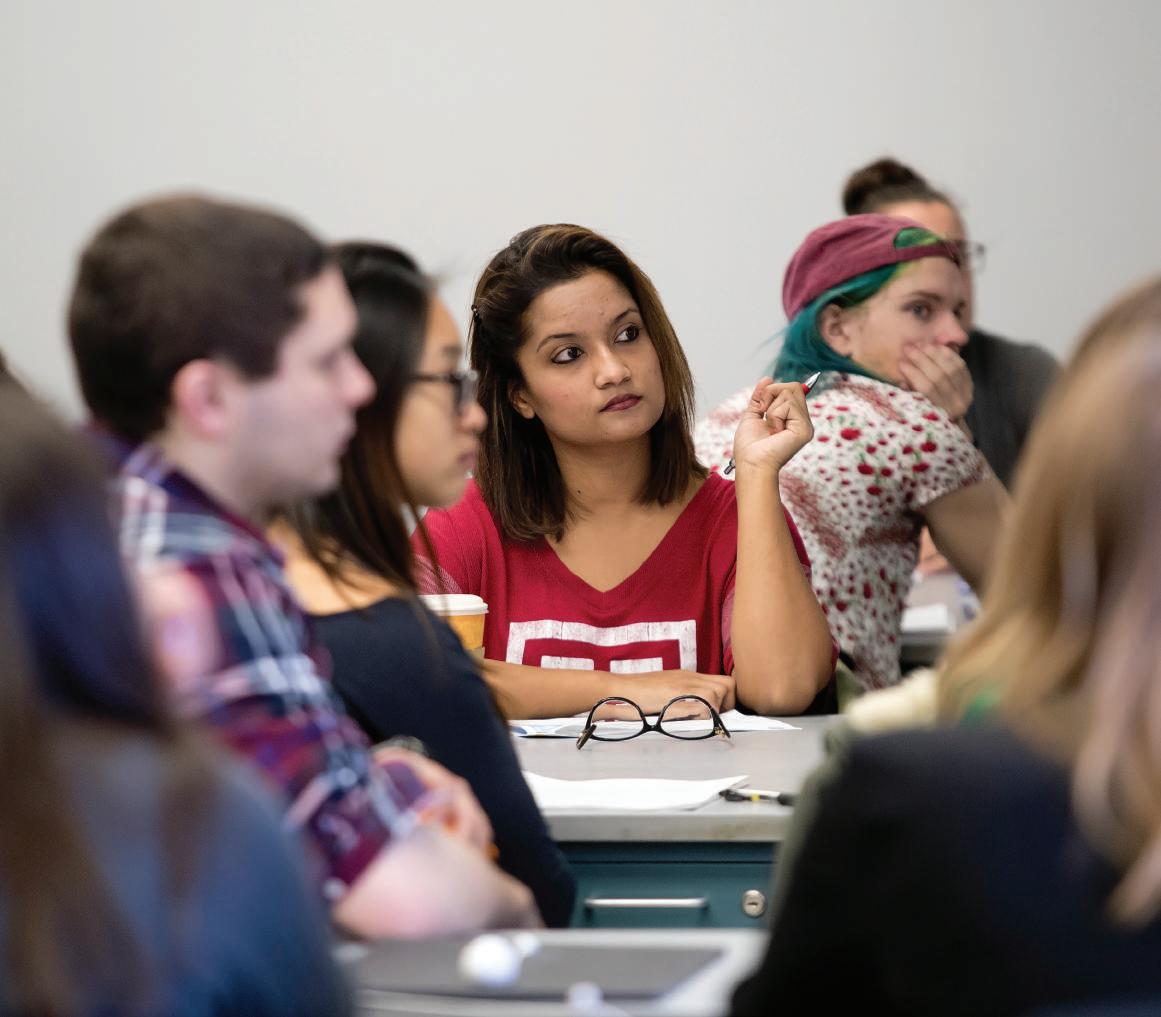
admissions.temple.edu





















































 W. FRANK ADAMS
Chief of the Upper Mattaponi Indian Tribe
PETER BROOKS
Commissioner of Indian Affairs for the State of Maryland
JESSICA LOCKLEAR Lumbee Tribal citizen and historian
CORNELIA DIMALANTA
Co-founder of Native American House Alliance
Close up of beaded work by Mayiki PlainBull and her mother, Sparrow.
W. FRANK ADAMS
Chief of the Upper Mattaponi Indian Tribe
PETER BROOKS
Commissioner of Indian Affairs for the State of Maryland
JESSICA LOCKLEAR Lumbee Tribal citizen and historian
CORNELIA DIMALANTA
Co-founder of Native American House Alliance
Close up of beaded work by Mayiki PlainBull and her mother, Sparrow.

 By Brigitte
By Brigitte











 By Ramses Montes
By Ramses Montes





 Aquí vemos a Chizick Agüero dirigiendo un rompehielos activo para que los estudiantes de McPherson empezaran a percibir las cosas de otra manera y a comunicar sus ideas con claridad.
McPherson es un espacio vibrante y activo, y nos facilitaron mucho las cosas su amable y servicial personal y los numerosos recursos disponibles.
Aquí vemos a Chizick Agüero dirigiendo un rompehielos activo para que los estudiantes de McPherson empezaran a percibir las cosas de otra manera y a comunicar sus ideas con claridad.
McPherson es un espacio vibrante y activo, y nos facilitaron mucho las cosas su amable y servicial personal y los numerosos recursos disponibles.













 By Xavier Garay
By Xavier Garay
 Por Xavier Garay
Por Xavier Garay


 Xavier shown here with his Uncle Mario in Santo Domingo, Dominican Republic in 2018
Rutgers University Cadet Xavier Garay at basic training at Fort Leonard Wood, Missouri in 2019
Xavier shown here with his Uncle Mario in Santo Domingo, Dominican Republic in 2018
Rutgers University Cadet Xavier Garay at basic training at Fort Leonard Wood, Missouri in 2019
 By Ramses Montes
By Ramses Montes




















 Compiled
Compiled












